 01/08/2008 16:07 01/08/2008 16:07 |
|
| | | OFFLINE | | Post: 14.517 | Registrato il: 28/08/2005
| Utente Gold | |
|
 Stories posted earlier on the preceding page:
The Pope is 'recovering the sacred'
Stories posted earlier on the preceding page:
The Pope is 'recovering the sacred' - Interview by La Repubblica's Marco Politi with Mons. Ranjith
of the Congregation for Divine Worship. Translated.
The Papacy weighs down on Joseph Ratzinger at age 81 - An ambivalent but seemingly sympathetic piece
written by Politi after the Pope's 21-hour flight to Sydney last July 14. Translated.
The Grand Mufti of Damascus wants Benedict XVI to visit during the Pauline Year - Stories by Vatican Radio,
ANSA and ZENIT.
 THE POPE'S PRAYER INTENTIONS
THE POPE'S PRAYER INTENTIONS
FOR AUGUST 2008
VATICAN CITY, JULY 31, 2008 (Zenit.org).- Benedict XVI will be praying this August that all may be more aware of the gift of creation.
The Apostleship of Prayer announced the general intention chosen by the Pope, "That the human family may know how to respect God's design for the world and thus become ever more aware of the great gift of God which Creation represents for us."
The Holy Father also chooses a missionary intention for each month. In August he will pray, "That the answer of the entire people of God to the common vocation to sanctity and mission may be promoted and fostered, with careful discernment of the charisms and a constant commitment to spiritual and cultural formation."
[Modificato da TERESA BENEDETTA 04/08/2008 00:23] |
|
 01/08/2008 18:32 01/08/2008 18:32 |
|
| | | OFFLINE | | Post: 14.518 | Registrato il: 28/08/2005
| Utente Gold | |
|

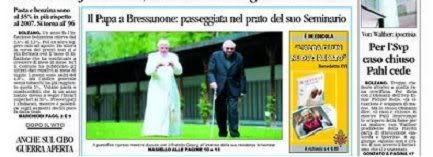 The coverage today in 'Alto Adige' (Page 1) and 'Avvenire' (inside page).
The coverage today in 'Alto Adige' (Page 1) and 'Avvenire' (inside page).
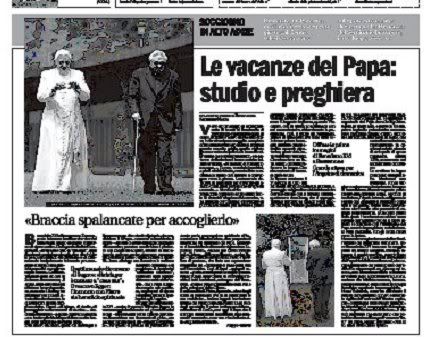 Predictably, any newspaper that had any report today about the Pope used at least one of the pictures released by the Vatican and taken yesterday at the Seminary garden - since these are the first ones out since the Pope arrived in Bressanone Monday, in which we also finally get to see his brother who arrived later that day.
Predictably, any newspaper that had any report today about the Pope used at least one of the pictures released by the Vatican and taken yesterday at the Seminary garden - since these are the first ones out since the Pope arrived in Bressanone Monday, in which we also finally get to see his brother who arrived later that day.
Just as during his stay in Kentworth, it seems the Holy Father has agreed to have the Vatican release some pictures of him while he is 'in retreat' - for which we can only be thankful. I think he realizes that as Pope, the interest in him is universal, and that, at his age, intervals during which there is no photo or video evidence that he is well and about are bound to raise morbid speculations - among those who are so inclined, and MSM notoriously are - about the state of his health.
Since the pictures and video are taken by his own 'home' team, there is no intrusion involved. [See ZENIT story yesterday about the frustration of the journalists who are in Bressanone to cover the Pope's vacation.]
Here's a first-hand account from someone who had breakfast with the Holy Father yesterday from Lella's blog
 'Bread, butter and memories' -
'Bread, butter and memories' -
and he had not yet seen Milly!
by Riccardo Gasperina
Translated from
Corriere dell'Alto Adige
August 1, 2008
BOLZANO - He is 85 but carries himself very well, Johann Mayr, canon of the Diocese of Bressanone, who had the occasion to have breakfast yesterday with Benedict XVI.
He has been one of the few lucky persons - outside of the Pope's immediate entourage, Seminary Rector Ivo Muser and the seminary's chief housekeeper, Suor Maria Pieta - to have been in contact with the Pope since he arrived in Bressanone Monday.
Since then, the Pontiff has yet to leave the premises of the Seminario Maggiore where he is staying during his two-week summer vacation.
Don Johann, what was it like having breakfast with the Pope?
It was a family atmosphere. It was around 8:30, and seated with us were his elder brother Georg, who is nearly blind now, the Pope's private secretary Georg Gaenswein, two Memores Domine lay sisters and a German nun.
"This is my family," the Pope told me, gesturing towards our tablemates.
I was invited for a simple reason - I have known Ratzinger a long time, since he was a cardinal. He and I were part of a small group of priests who took our meals together in the Seminary [during the summer holiday].
Every day as he did today (Thursday), he said Mass at the nuns' chapel together with his family.
What did you talk about?
We chatted for maybe 20 minutes before the Pope had to go. Years ago, we would ask the then-cardinal if he could tell us behind-the-scenes stories about events at the Vatican. He always seemed to find that annoying, so we learned to stop asking him that sort of question. I think he appreciates such discretion.
So this time we spoke of secondary matters - the death of don Zambelli, who was part of the Pontiff's 'family', and about his replacement.
He did express the wish to coddle Milly, the black cat who lives in the seminary and whom he had not yet seen this time.
Can you describe to us the Pontiff's quarters?
I can tell you very little. The corridors were closed. The Swiss Guards were very strict even with those of us who were allowed within. All the elevators required keys to operate.
All I know is that 12 Biedermeier-style chairs were brought in from the library to be used in the Pope's dining room, and that they laid down marble slabs at the garden's edge in order to keep out the humidity. They also set up a traditional vaulted pillar under which there is a statue of the Virgin where the Pope may pray.
What did the Pope eat?
A white bread that had seeds [maybe the Wizinger!] , with butter and jam. He had a caffe-latte with it.
P.S. Although I cannot access the regional Corriere, from which the above report was taken, the national Corriere remains accessible. It does not have any story or photo about the Pope today. Its last story on the Pope was on July 31 - a brief item by Luigi Accattoli reporting that the notorious 'crucified frog' had been removed from the entrance to the new contemporary art gallery of Bolzano-Bozen, the Museion, in deference to the Pope's visit.
Accattoli quotes Don Josef Gelmi, curator of Bressanone-Brixen's diocesan museum, as being happy about the development: "No one questions artistic freedom, but it's one thing to make room for all kinds of opinion, and another to use such a provocative work as the emblem for the exhibit."
 today carried a story anticipating Sunday's Angelus (not much new) which I will translate later.
today carried a story anticipating Sunday's Angelus (not much new) which I will translate later.
Meanwhile, the local newspapers in Alto Adige are promoting a special offer of the beautiful coffee-table book Benedetto XVI - L’alba di un nuovo papato (Benedict XVI: The dawn of a new Papacy), which first came out in 2006, with photographs by veteran Vatican photojournalist Gianni Giansanti and text by TIME magazine's Rome correspondent Jeff Israely. Anyone who buys a newspaper may purchase it for only 9.90 euro.
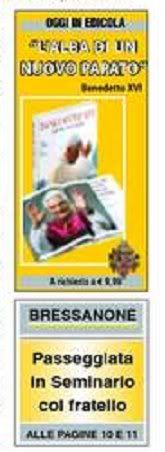

 has now posted its 8/2/08 issue online. It has no story or photo about the Pope.
[Modificato da TERESA BENEDETTA 03/08/2008 05:14] |
 01/08/2008 22:28 01/08/2008 22:28 |
|
| | | OFFLINE | | Post: 14.520 | Registrato il: 28/08/2005
| Utente Gold | |
|
 John Allen wraps up for Anglophone readers much of the material that the Italian press has reported (duly posted on this Forum) since it was first known that the Holy Father would spend his summer holiday this year in Bressanone.
John Allen wraps up for Anglophone readers much of the material that the Italian press has reported (duly posted on this Forum) since it was first known that the Holy Father would spend his summer holiday this year in Bressanone.
In addition, however, he brings up some important positions that Cardinal Ratzinger articulated in his 1984 Bressanone interview with Vittorio Messori - reminders that are fascinating to read in hindsight because they reinforce yet again how consistent Joseph Ratzinger is, with the consistency of one who simply states the truth as it is, and does not need to dress it up or to adapt it to circumstances.
 Benedict's vacation spot
Benedict's vacation spot
is significant in his history
All Things Catholic
by John L. Allen, Jr.

August 1, 2008
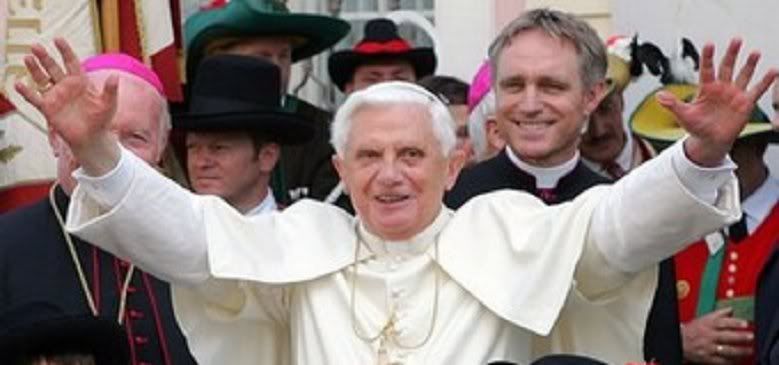
Pope Benedict XVI is on vacation from July 28 to Aug. 11, passing his summer break in an Alpine town in northern Italy known as Bressanone by Italians and Brixen by German-speakers. Benedict is a guest of the local seminary, lodging in an apartment known colloquially as "the bishop's room."
It's a setting where this Pope clearly feels at home.
Aside from the fact that the Pope's family, on his mother's side, has roots in the surrounding region (known as Alto Adige in Italian and Südtirol in German), over the years Joseph Ratzinger has come to be on intimate terms with Bressanone and its seminary.
As a rising young theologian in 1967, Ratzinger lectured at a conference in Bressanone on the figure of the priest in the New Testament and the recent decree of the Second Vatican Council on the priesthood, Presbyterorum Ordinis.
He was obviously impressed, because from 1968 to 1977 Ratzinger and his brother Georg, along with their sister Maria, vacationed in Bressanone, usually lodging at a local hotel. (The owner recently recalled that the Ratzinger siblings took three single rooms on the third floor of the 45-bed hotel, sharing a bathroom in common.)
After Ratzinger was named archbishop of Munich-Freising in 1977, he continued to summer in Bressanone as a guest of the seminary, befitting his new ecclesiastical status. He kept coming back after relocating to Rome in 1981; between 1977 and 2005, Ratzinger passed his summer break there 10 times.
He became such a regular, in fact, that the rector gave him his own key to the seminary library. There's even a shady patch of the garden informally named for Ratzinger, before his election as Pope, because of his predilection for reading there.
Some of the Pope's writing owes its gestation to Bressanone. He completed the first four chapters of Jesus of Nazareth here in August 2004, and rumor has it that Benedict may use some of his down time this summer to work on the promised second volume.
This is Benedict's first visit to Bressanone since his election three years ago.
All this might seem a charming, but largely insignificant, footnote to the Pope's biography, were it not for the fact that Bressanone was the setting for a defining moment in Joseph Ratzinger's life and career.
It was in his seminary apartment, overlooking the garden, where Ratzinger granted an incendiary interview to Italian Catholic journalist Vittorio Messori over three days in August 1984. Extracts were published in late 1984 by the magazine Jesus, immediately causing a global sensation, and the entire interview appeared in book form in early 1985 under the Italian title Rapporto sulla fede, and in English as The Ratzinger Report.
Some 23 years later, it can be difficult to recall the earthquake the book triggered. Ratzinger bluntly described a "crisis" in Catholicism after the Second Vatican Council (1962-65), the antidote to which was rejecting an "unrestrained and unfiltered opening to the world" and emphasizing the continuity of Vatican II with earlier eras of tradition.
The Ratzinger Report was an immediate best-seller, with more than a half-million copies gobbled up in the United States alone. It polarized opinion dramatically; as Messori recalled, it seemed everyone felt the need to take a stand for or against the cardinal's vision.
Looking back, it's striking how many vintage Ratzinger stereotypes either originated in widely quoted passages from the book, or were crystallized by them: [While I realize that this list is supposed to be of stereotypes - false ones - about Joseph Ratzinger, one can't help bristle at the absurd conclusions projected, sometimes just from simple statements of fact!]
1. Ratzinger the pessimist
"Western culture is hellish when it persuades men that the sole aim of life is pleasure and self-interest. … Today more than ever, the Christian must be aware that he belongs to a minority and that he is in opposition to everything that appears good, obvious, logical to the 'spirit of the world,' as the New Testament calls it. … It is time to find again the courage of non-conformism, the capacity to oppose many of the trends of the surrounding culture, renouncing a certain euphoric post-conciliar solidarity."
2. Ratzinger the restorationist
"If by restoration we understand the search for a new balance after … the overly positive interpretations of an agnostic and atheistic world, then a restoration understood in this sense (a newly found balance of orientation and values within the Catholic totality) is altogether desirable and, for that matter, is already in operation in the Church."
3. Ratzinger's change of heart about Vatican II
"What the popes and the council fathers were expecting was a new Catholic unity, and instead one has encountered a dissension which -- to use the words of Paul VI -- seems to have passed over from self-criticism to self-destruction. … There had been the expectation of a step forward, and instead one found oneself facing a progressive process of decadence that to a large measure has been unfolding under the sign of a summons to a presumed 'spirit of the council,' and by so doing has actually and increasingly discredited it."
4. Ratzinger's obsession with socialism
"The 'absolute good' (and this means the building of a just socialistic society) becomes the moral norm that justifies everything else, including -- if necessary -- violence, homicide, mendacity.... And what looks like 'liberation' turns into its opposite and shows its diabolic visage in deeds." [This is the first time I read that he has been accused of 'obsession with socialism'.]
5. Ratzinger's hostility to bishops' conferences
"In many episcopal conferences, the group spirit and perhaps even the wish for a quiet, peaceful life or conformism lead the majority to accept the positions of active minorities bent upon pursuing clear goals." [I would not call it 'hostility' but 'reservations' - and he has since been very clear about it. His principal reservation is that the conferences have diluted the idea of any personal responsibility by any single bishop member for the conference consensus.]
6. Ratzinger the Grand Inquisitor
"Every theologian now seems to want to be 'creative.' But his proper task is to deepen the common deposit of the faith as well as to help in understanding and proclaiming it, not 'to create' it." [But how does that commonsense statement of fact lead to calling him a 'Grand Inquisitor'?]
7. Ratzinger the autocrat
"The Church of Christ is not a party, not an association, not a club. Her deep and permanent structure is not democratic but sacramental, consequently hierarchical." [Again, he is simply stating fact.]
8. Ratzinger the anti-feminist
"What radical feminism -- at times even that which asserts that it is based on Christianity -- is not prepared to accept is precisely the exemplary, universal, unchangeable relationship between Christ and the Father ... I am, in fact, convinced that what feminism promotes in its radical form is no longer the Christianity that we know; it is another religion." [He is being charitable, of course. Militant feminism of the kind that insists women have a divine right to be priests is sheer female chauvinism, which is essentially nothing more than narcissistic arrogance!]
The furor all this [the book] set off is difficult to overstate.
For liberal Catholics, it seemed the polite veil had been ripped off the Vatican and its true essence revealed -- fearful, defensive, hostile to creative thought and to dialogue with the world. [What could be less 'fearful and defensive and hostile to creative thought and dialogue' than to come out openly the way Cardinal Ratzinger did and engage the issues clearly, directly and frankly?]
Conservatives rejoiced that someone in authority had the wherewithal to say out loud what many of them had long felt about the direction of the church after Vatican II. In any event, the battle lines in Catholicism had been well and truly drawn.
A statement issued about the book by a group of priests in Munich, Ratzinger's former archdiocese, was typical: "Those who, like Ratzinger, exalt themselves in such a triumphalistic manner above everything … exclude themselves as dialogue partners," the priests said.
In September 1985, the Synod of Bishops met in Rome to look back at Vatican II after 20 years. Despite four weeks of speeches, debates, and work towards a set of resolutions, the only thing journalists seemed to care about was Ratzinger; at one stage, Cardinal Godfried Danneels of Belgium snapped during a press conference, "We're having a synod around a council, not a book!"
[I have referred a couple of times - and cited passages - to George Weigel's treatment of the Ratzinger Report and its indirect influence on that Bishops' Synod in his biography of John Paul II, Witness to Hope, pp. 502-505 - and how it led, among other things, to preparing the Catechism of the Catholic Church.]
The drumbeat became so intense that the papal spokesperson at the time, Joaquin Navarro-Valls, even felt compelled to put a bit of distance between Pope John Paul II and his top lieutenant. While stressing that John Paul cherished Ratzinger, Navarro-Valls hinted that the Pope might have phrased things in a sunnier fashion.
"Ratzinger is right in what he has written in the book," Navarro-Valls told reporters, " but he is not right in what he has not written." [What on earth does that mean? Regardless, perhaps it is significant that Weigel did not include this statement from Navarro-Valls in the JP-II biography, and that, in fact, he states categorically, among other things, "Rapporto (sulla Fede) was a major factor in setting the intellectual framework in which the (1985) Synod's deliberations were conducted and its recommendations framed. The issues in the Synod were, in large part, those discussed by Cardinals Wojtyla and Ratzinger prior to the Conclaves of 1978". ]
All of which brings us back to Bressanone, because it was here that the image of "Herr Panzerkardinal" was set in cement, and it is now here that Benedict XVI arrives after having done a great deal over the last three years to lay that image to rest.
To be sure, there were flashes in that long-ago conversation with Messori of what I've come to describe as Benedict's "affirmative orthodoxy," meaning his capacity for expressing the doctrinal essentials of Christianity in a positive spirit.
For example: "The only really effective apologia for Christianity comes down to two arguments, namely, the saints the Church has produced and the art which has grown in her womb."
In a similar vein: "A theologian who does not love art, poetry, music and nature can be dangerous. Blindness and deafness toward the beautiful are not incidental; they necessarily are reflected in his theology."
Or this: "Salvation for the church comes from within her, but this in no way means to say that it comes from the decrees of the hierarchy."
On the whole, however, the popular take at the time was that The Ratzinger Report was too much orthodoxy, not enough affirmation. [That's too pat a statement to mean anything - what else is genuine orthodoxy but a positive affirmation of belief?]
At the level of public impressions, Benedict today seems to have these two dimensions of his outlook more in sync. His ideas have not mutated, but his mode of expression, and thus the public reaction he typically elicits, is different. Positive responses to his recent visits to the United States and Australia make the point.
In that light, it might be a fascinating exercise if Benedict were once again to sit down with a journalist during his break in Bressanone, covering some of the same ground, in order to gauge how his intervening 23 years of experience and his new perspective as pope might affect his approach.
It's reasonable to suspect that the orthodoxy would be the same, but the affirmative tone more resounding.
Speaking for myself, I'd volunteer for the assignment.
[I don't blame Allen for presenting himself! However, if Benedict XVI ever wanted to do another interview-book, Messori and Peter Seewald are necessarily at the head of the line because quite apart, from their track record with him, the Pope feels at home being interviewed in German or Italian, not in English. Though Allen could well interview him in Italian.
Also, the Cardinal's tone in The Ratzinger Report was hardly non-affirmative, as I doubt Joseph Ratzinger has ever been! Judging the tone of statements is very much in the ear of the listener, especially someone who is not objective and has his own agenda to promote.]

Here are 'clean' versions of GG's birthday photo (actually taken the day after, July 31) eventually released by the Vatican:
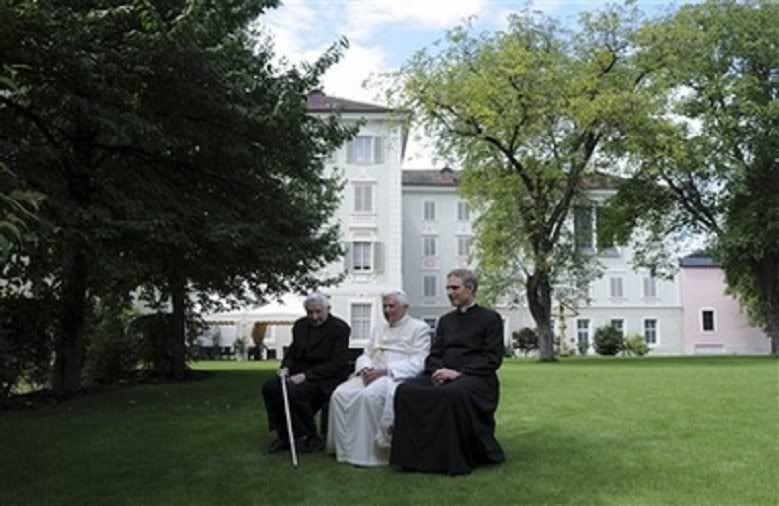
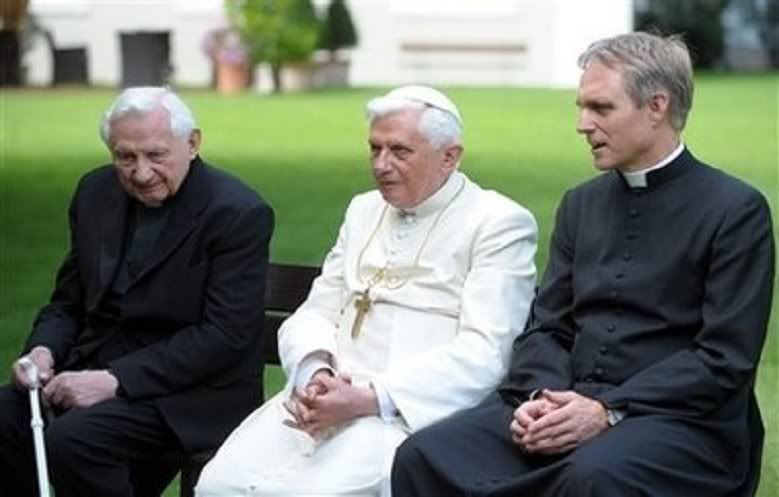
An item today in

says Don Ivo Muser, rector of the Seminario Maggiore, bought an oil painting by a German artist - showing Piazza Duomo (Cathedral Square) seen from Piazza Vescovado (square by the old Bishops' Palace, now the Diocesan Museum) in earlier times - as a birthday present from the Church of Bressanone for Mons. Gaenswein, to remind him of his 52nd birthday spent in the city with the Holy Father.
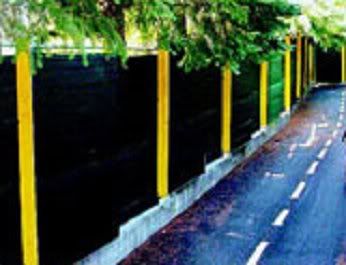 Part of the 10-foot-high protective fence around the back of
Part of the 10-foot-high protective fence around the back of
the Seminario Maggiore to help protect the Holy Father's privacy.
[Modificato da TERESA BENEDETTA 04/08/2008 00:22] |
 02/08/2008 14:22 02/08/2008 14:22 |
|
| | | OFFLINE | | Post: 14.524 | Registrato il: 28/08/2005
| Utente Gold | |
|


has a weekend pullout special on the Holy Father's visit, which may be accessed here:
www.minicity.it/advertorial/papa_bressanone/
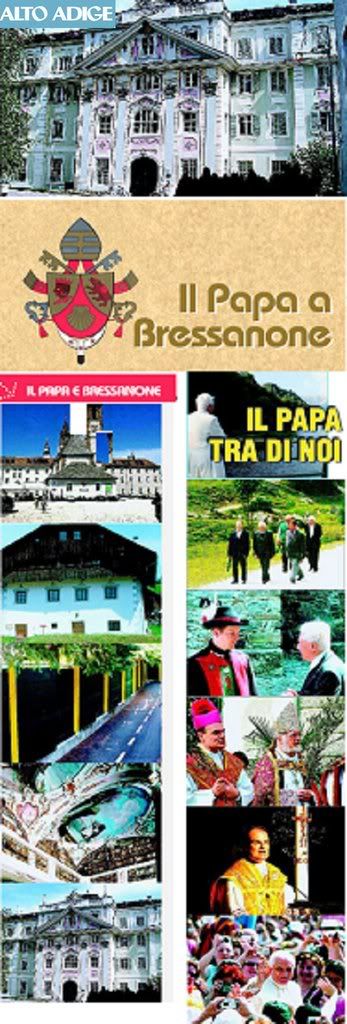
Most of the material in the special has already been reported in this Forum, but there are a couple more informative articles that should be translated - such as Bressanone's esperience with Popes (a bishop of Bressanone became Pope Damasus II in 1048) and an idea of the rich cultural program in the city during Pope Benedict's current vacation.
 I failed to note this report in the Times of London earlier this week. Typically, it leads off a story about the Pope's vacation with a minor controversy.
'Crucifrog' sculpture
I failed to note this report in the Times of London earlier this week. Typically, it leads off a story about the Pope's vacation with a minor controversy.
'Crucifrog' sculpture
near Pope's summer holiday base
provokes protests
by Richard Owen in Rome

Pope Benedict XVI's summer break at a seminary in the mountains of northern Italy has led to demands for the removal of a "provocative" sculpture of a crucified frog on show in a nearby museum.
Local Catholics have complained to the police that the work by the German artist Martin Kippenberger, on show at the Bolzano Museum of Modern Art, is a "public obscenity".
It depicts a bright green frog with its tongue hanging out, nailed to a cross, with a beer mug in one outstretched hand and an egg in the other.
Pope Benedict began his summer break this week near Bolzano at Bressanone (Brixen) in the mountains of Trentino-Alto Adige, also known as South Tyrol, which was part of Austria until Italy gained it after the First World War.
The Pope, who recently returned from Australia and is to visit Lourdes in September, greeted hundreds of well-wishers in both Italian and his native German at the Bressanone seminary.
The Pontiff used both names for the town, saying in his German remarks: “I am very happy to be back with you in Brixen, which holds so many happy memories for me.” He visited the seminary ten times as a cardinal.
It is not known whether the pontiff plans to visit Bolzano and the art museum. However Monsignor Wilhelm Egger, Bishop of Bolzano and Bressanone, revealed that he had discussed the sculpture with the Pope. He declined to say how the pontiff had reacted.
The Union for South Tyrol, a separatist group, said it had collected 10,000 signatures for a petition demanding the removal of the crucified frog. Franz Pahl, the president of Trentino-Alto Adige regional council, has gone on hunger strike in protest over the exhibit.
Luis Durnwalder, the head of the local province, said he supported contemporary art, but not "pure provocation ... The principles of respect for popular feeling and of artistic freedom have to find a reciprocal tolerance through good will and with understanding from both sides."
Under pressure from Bishop Egger the museum curators have moved the frog from the museum entrance to the third floor, but have so far refused to remove it altogether. They said the work was not an attack on Christianity but rather a reflection of the artist's “state of profound crisis” at the time.
Two years ago the Bolzano museum hit the headlines by displaying a work of art consisting of a toilet flushing to the accompaniment of Italy's national anthem.
Pope Benedict will lead Angelus prayers at the local cathedral and is to be made an honorary citizen of Bressanone before returning on August 11 to Castelgandolfo, the papal summer residence in the Alban Hills south of Rome.
He is accompanied at Bressanone by his brother, Father Georg Ratzinger, who shares the Pope's love of music. A grand piano has been installed at the seminary, which was founded in the eleventh century.
The Vatican said the Pope would read, play music and enjoy strolls in the mountains. Last year he chose Lorenzago di Cadore, near Belluno in the Veneto, for his summer break, after two consecutive years spent at a chalet in Les Combes, Valle D'Aosta.
While at Bressanone he is expected to work on his next encyclical, on social issues and globalisation, and on the second part of his study Jesus of Nazareth, the first volume of which is a global bestseller.
The seminary has been vacated for his stay, but the Pontiff, who is known to like cats, will have the company of Milly, the seminary's black cat.
Milly is cared for by Maria Pieta, the Mother Superior, who is staying on at the seminary together with the rector, Father Ivo Muser, during the Pope's holiday.
The rector told Corriere della Sera that in the past, the Pope liked to have Milly at his side while reading and "dedicates a few moments to her every day, stroking her head".
[Modificato da TERESA BENEDETTA 03/08/2008 05:15] |
 02/08/2008 15:26 02/08/2008 15:26 |
|
| | | OFFLINE | | Post: 14.528 | Registrato il: 28/08/2005
| Utente Gold | |
|
 I missed this yesterday when posting reports on the Grand Mufti's invitation to the Pope - this AP story includes a reaction from the Vatican.
Syria's Grand Mufti
I missed this yesterday when posting reports on the Grand Mufti's invitation to the Pope - this AP story includes a reaction from the Vatican.
Syria's Grand Mufti
invites Pope to Syria

VATICAN CITY, August 1 (AP) - Syria's Grand Mufti, the country's top Sunni Muslim religious authority, says he would like to meet Pope Benedict XVI and persuade him to visit Syria.
The mufti, Sheik Ahmad Badereddine Hassoun, made the comments in Damascus, according to the Italian news agency Apcom and other reports Friday.
"I would like to invite the Holy Father to visit our country, following in the footsteps of St. Paul," Hassoun was quoted by Apcom as saying. "I am available for a meeting at the Vatican. I would like to see him one on one to plan the visit together."
Benedict's predecessor, Pope John Paul II, made a groundbreaking visit to the Ummayad Mosque in Damascus in May 2001.
Benedict has been vacationing in the Italian Alps.
The Vatican spokesman, the Rev. Federico Lombardi, said the invitation attests to the current "serene climate" in Syria and "good relations" with the country.
Benedict has been trying to improve ties with Islam since giving a speech in Germany in 2006 that angered many in the Muslim world.
In the Regensburg University speech, Benedict cited a medieval text that characterized some of the teachings of the Prophet Muhammad as "evil and inhuman," particularly "his command to spread by the sword the faith."
The Pope later said he was "deeply sorry" about the reactions his remarks sparked and stressed that they did not reflect his own opinion.
Hassoun, a moderate cleric, said the case was closed.
"There is a dialogue, and between religions and intellectuals there are always discussions," he said, according to Apcom. "One can fight with one's wife, but then the love grows."
Hassoun is among a group of 138 Muslim scholars that has called for greater dialogue between Christians and Muslims.
Benedict XVI met with Syria's vice president in September to discuss the situation of Christians in Syria and the role Damascus should play in bringing peace to the Middle East.
The Pope has urged Syria to use its influence in the region to help resolve conflicts and counter terrorism.

Orazio La Rocca - who with Marco Politi, covers the Vatican and religion for
 was one of the Italian journalists who met with the Grand Mufti in Damascus. He has interesting details to add to the other reports.
was one of the Italian journalists who met with the Grand Mufti in Damascus. He has interesting details to add to the other reports.
"I immediately wrote to the Holy Father to ask for a clarification after the words he was reported to have said in Regensburg," the Grand Mufti said, "and he answered me, explaining the sense of his entire intervention. It was really an academic lecture but it was presented in the media as an attack against Islam."
In any case, the Mufti said, even after the polemics that erupted over the Regensburg lecture, "the dialog between us was not broken and everything was resolved well. The quarrel (over Regensburg) was like a dispute between spouses. After the quarrel is over, then they should love each other more."
However, taking the Regensburg episode almost as a model - to which he adds the great dispute that had provoked a crisis between the West and Islam before Regensburg (over the Danish cartoons on Mohammed) - the Grand Mufti did not spare words against "the press and the journalists (who) wrote falsehoods to foment inter-religious hatred with the clear intent to denigrate Islam and religion."
His invitation to the Pope appeared sincere and convincing.
If Benedict XVI accepts, his visit to Syria would be the high point of the Pauline Year, which will see an official pilgrimage to Damascus by the Italian bishops in October, under the leadership of Cardinal Angelo Bagnasco, Archbishop of Genoa.
That visit will be returned by a pilgrimage to the tomb of St. Paul in Rome by a Syrian delegation to be led by the Grand Mufti, with Syrian government officials of ministerial rank. They will also participate in related events like the international festival of religious tourism sponsored by the Opera Romana Pellegrinaggi, the Vatican travel agency that organizes pilgrimages.
[Modificato da TERESA BENEDETTA 03/08/2008 17:36] |
 02/08/2008 17:41 02/08/2008 17:41 |
|
| | | OFFLINE | | Post: 14.531 | Registrato il: 28/08/2005
| Utente Gold | |
|
  L'Osservatore Romano today has a lengthy interview with Giovanni Rocchi, director of the Vatican's Office of Health and Hygiene. The following excerpt describes internal provisions for handling any emergencies that have been in place since the Pontificate of John Paul II.
About the Vatican's health system
L'Osservatore Romano today has a lengthy interview with Giovanni Rocchi, director of the Vatican's Office of Health and Hygiene. The following excerpt describes internal provisions for handling any emergencies that have been in place since the Pontificate of John Paul II.
About the Vatican's health system
and its emergency services
Translated from
an interview in
the 8/2/08 issue of
 Is there a special emergency service for the Pope?
Is there a special emergency service for the Pope?
Of course - entirely in keeping with how the practice of medicine has evolved.
You know that in the past, Popes rarely went out of the Vatican. Not even for medical treatment or surgery. Without going back too far in time, I would remind you that for Paul VI, the surgeons simply improvised an operating room in the Papal apartment when he required prostate surgery.
But since the 1980s, precisely because of advances in emergency medicine, it was obvious that a physician's house call was no longer enough to assist the Pope medically.
Assistance to the Pope was and continues to be the principal focus of this organization. So, the state-of-the-art requires that there should always be on call a specialist in resuscitation who is able, when necessary, to stabilize the patient clinically while he is transported to the nearest hospital to get the appropriate full treatment.
This system was operational right after the assassination attempt on John Paul II on May 13, 1981. Just the day before, Papa Wojtyla had visited our offices and blessed the first ambulance equipped for emergency resuscitation that had been donated to the Vatican.
That same ambulance brought him the next day to the Policlinico Gemelli, after the shooting at St. Peter's Square. Since then, wherever the Pope is, a properly equipped emergency ambulance with a qualified medical team is always standing by.
Even when the Pope is at the Vatican and does not have any official activities?
It is always nearby and ready. Because it can also be used for others who require such services. It is available 24/7. [I am sure the same system is operative when the Pope is travelling. In New York, the Papal motorcade always included an ambulance. In between events, it was parked the next street over from the Nunciature.]
How many doctors does the Vatican system employ?
We have 16 internists (specialists in internal/general medicine) on staff. Then we have 11 others on contract, 51 specialists in the various medical specialities, and 21 other substitute internists.
[Modificato da TERESA BENEDETTA 02/08/2008 17:54] |
 02/08/2008 20:07 02/08/2008 20:07 |
|
| | | OFFLINE | | Post: 14.532 | Registrato il: 28/08/2005
| Utente Gold | |
|

While Bressanone-Brixen and its surroundings are all excited about the Angelus
with the Holy Father tomorrow, it wasn't even mentioned in

for tomorrow, Sunday, 8/3/08, which does feature this front-page photo:
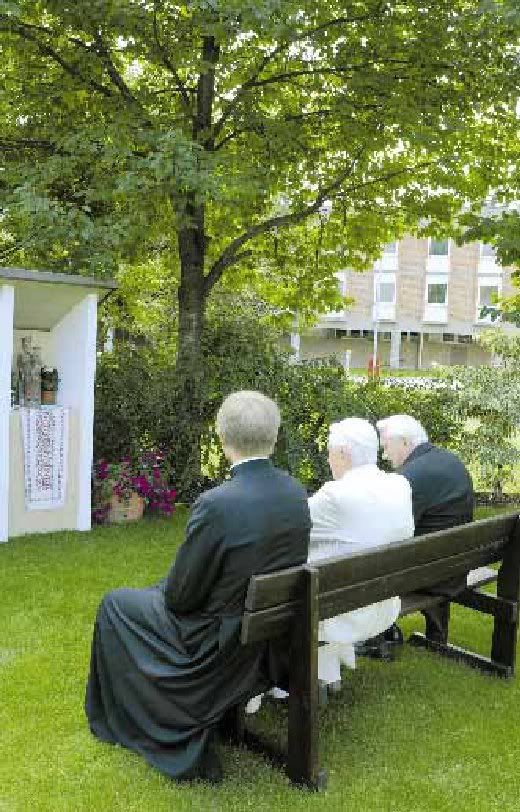 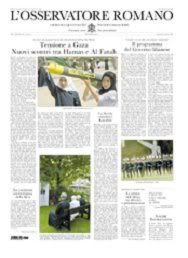 The caption: A moment of Benedict XVI's day in Bressanone: With his brother and private secretary in the garden of the Seminary where he is a guest, in front of a kiosk with an image of Sedes Sapientiae/Sitz der Weisheit (Seat of Wisdom), reproduced from
The caption: A moment of Benedict XVI's day in Bressanone: With his brother and private secretary in the garden of the Seminary where he is a guest, in front of a kiosk with an image of Sedes Sapientiae/Sitz der Weisheit (Seat of Wisdom), reproduced from
a late 13th century work in the collection of the diocesan museum.

is equally reticent, though it has a Page 17 story
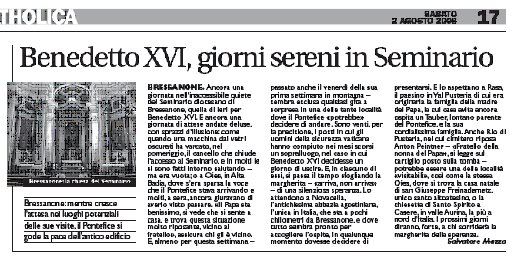 'Benedict XVI: quiet days in the Seminary'
'Benedict XVI: quiet days in the Seminary'
with a photo of the Seminary church:
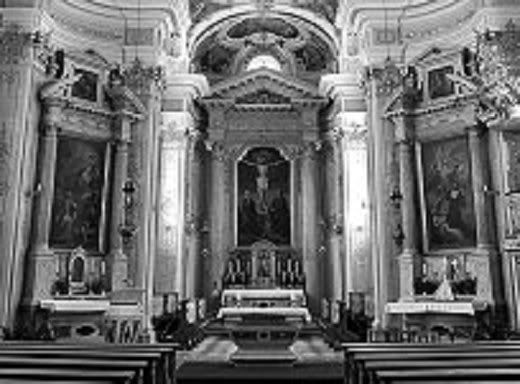
But on the front page of

today, 8/2/08:
 'Angelus: 20,000 expected tomorrow:
'Angelus: 20,000 expected tomorrow:
The city is secured; the rules to be followed'
and an inside story
'The Pope rests, while some claim to have seen him in Oies'
Here is a translation of the main story:
An army of volunteers
to help with the 'invasion'
by Luca Masielli
BRESSANONE - At 7 a.m. tomorrow, barriers will be put up at all access roads to the city. At 7:30, the gates will open to ticketholders for the Angelus at Piazza Duomo. At 11 a.m. Mass, to be celebrated by Mons. Wilhelm Egger, Bishop of Bolzano-Bressanone/Bozen-Brixen; and at 12 noon, the Angelus with the Holy Father.
Everything is ready for the event.
It is a day on which the Prefecture, the province and the city - with the help of 450 volunteers, in addition to local and state police, frie brigades and health personnel - have organized to the minute so that the influx of pilgrims may take place without any security problems.
There will be at least 9,000 faithful in Piazza Duomo but many others are expected, and the overflow can watch the ceremony on maxi-screens set up in convenient gathering points.
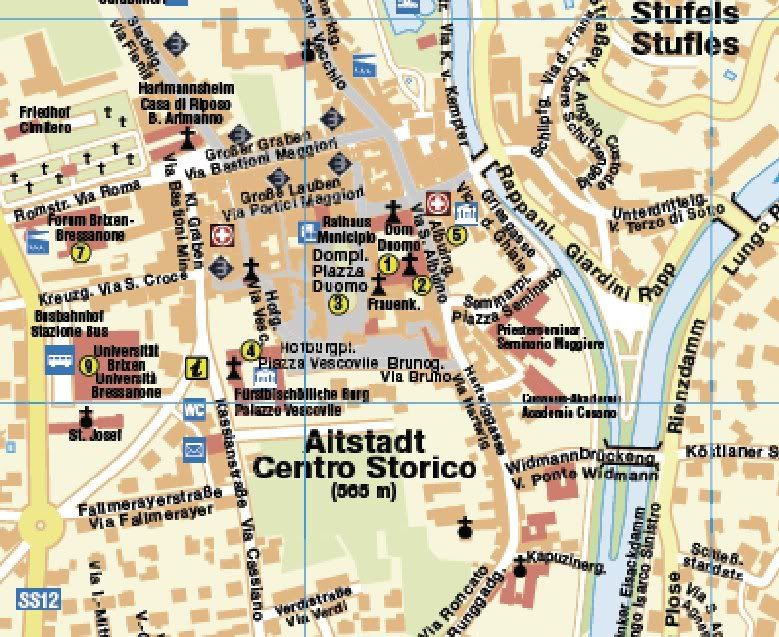 Map of Bressanone's Altstadt, its historic center, which includes the Duomo (Cathedral) and the nearby Seminario Maggiore. NB: The Stufels area is where the Hotel Gruener Baum is located. Map of Bressanone's Altstadt, its historic center, which includes the Duomo (Cathedral) and the nearby Seminario Maggiore. NB: The Stufels area is where the Hotel Gruener Baum is located.
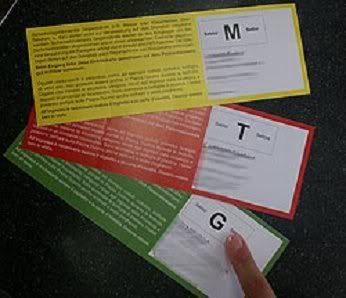
Ticketholders are expected to start showing up at light of dawn, and they will have two hours, 7:30-9:30, to find their places. After 9:30 the entrances to the Piazza will be closed.
Expected to concelebrate the Mass with Mons. Egger are Cardinal Angelo Bagnasco, Archbishop of Genoa, Cardinal Crescenzio Sepe, Archbishop of Naples, and the Archbishop of Innsbruck (capital of the Austrian Tyrol). The rites will be broadcast on Eurovision.
It is an unequalled opportunity for Bressanone-Brixen to be on the world stage, and nothing has been left to chance in terms of security measures.
The city will have 20 shuttle buses to bring pilgrims from designated parking places in the city periphery to Piazza Duomo (and back later), able to move about 6,000 people per hour.
Ample provision has been made for health service assistance as well.
Pilgrims who have no assigned seats are allowed to bring folding chairs, and umbrellas and hats are advised, but no knives or glass bottles.
After the Mass, there will be musical numbers by a choir and by the city band. At 11:50, Pope Benedict XVI will leave the Seminary by foot to proceed to the altar on the Piazza.
After the Angelus, there will be a brief 'baciamano' - when the Pope receives some of the faithful who generally kiss his ring in homage. Then he will return to the Seminary.
[Modificato da TERESA BENEDETTA 03/08/2008 05:16] |
 02/08/2008 21:17 02/08/2008 21:17 |
|
| | | OFFLINE | Post: 3.233 | Registrato il: 23/11/2005
| Utente Master | |
|
' The Pope rests, while some claim to have seen him in Oies'
Okay, where in the heck is Oles and what's there? Can't find it anywhere on the map. ![[SM=g27813]](https://im0.freeforumzone.it/up/0/13/5117592.gif)
 Sorry, I didn't bother to 'annotate' Oies, because the story was sheer fabrication. And you won't find it on regular maps because apparently, it is a five-house hamlet in the town of Badia. It's been such a problem finding 'reproducible' maps online since the Google maps became common, but in this map of the region, which providentially shows Muehlbach/Rio di Pusteria at the top rim - so we can see how near it is to Bressanone (the map enlargement is deceiving, because it is only 10-15 kms away!) - Badia is off to the east of it (not on the map).
Sorry, I didn't bother to 'annotate' Oies, because the story was sheer fabrication. And you won't find it on regular maps because apparently, it is a five-house hamlet in the town of Badia. It's been such a problem finding 'reproducible' maps online since the Google maps became common, but in this map of the region, which providentially shows Muehlbach/Rio di Pusteria at the top rim - so we can see how near it is to Bressanone (the map enlargement is deceiving, because it is only 10-15 kms away!) - Badia is off to the east of it (not on the map).
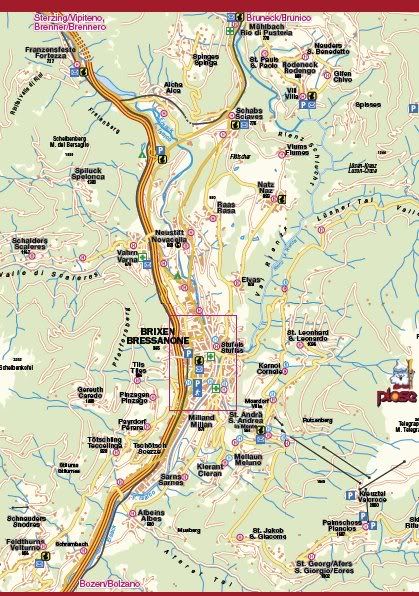 Oies is the birthplace of St. Joseph Freinademetz, the region's first saint, canonized in 2003 by John Paul II. He attended the seminary in Brixen. He distinguished himself by serving as a missionary in China from 1879 until his death in 1908.
Oies is the birthplace of St. Joseph Freinademetz, the region's first saint, canonized in 2003 by John Paul II. He attended the seminary in Brixen. He distinguished himself by serving as a missionary in China from 1879 until his death in 1908.
TERESA
8/3/08
P.S. Inasmuch as, according to AP, the Holy Father made a refernce to St. Joseph Freinademetz in his Angelus message today, here are some pictures taken by Johannes Simon for AFP/Getty Images showing the saint's birthplace house in Oies, a memorial to him, and the room where he was born.
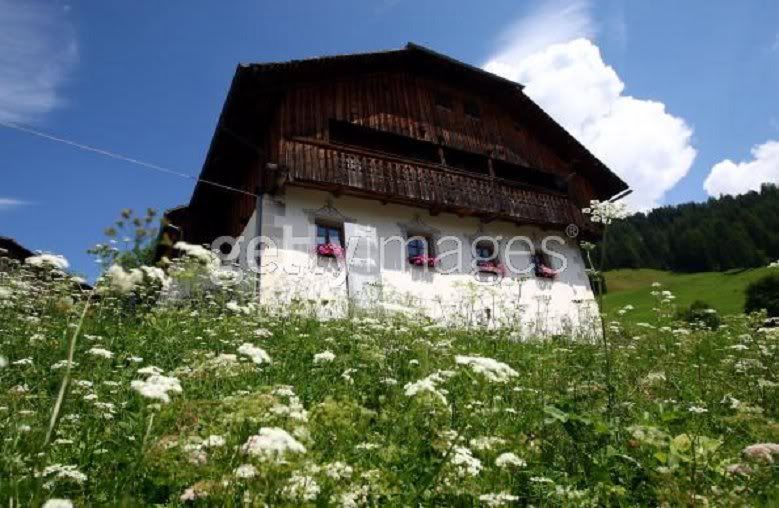
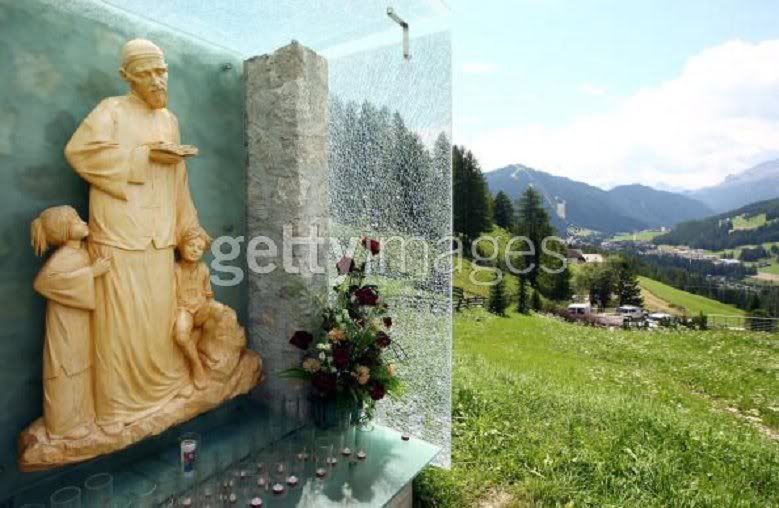
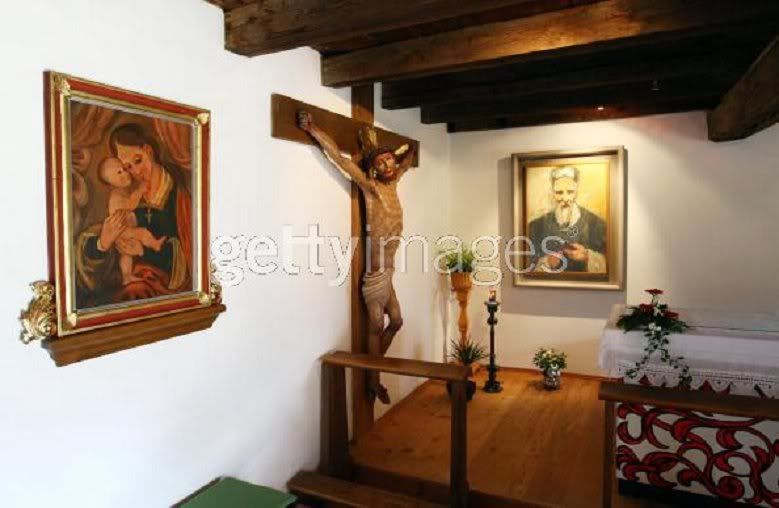 Mr. Simon also took this photograph of the resting place of the Pope's grandmother,
Mr. Simon also took this photograph of the resting place of the Pope's grandmother,
Maria Tauber-Peinter, in Muehlbach:
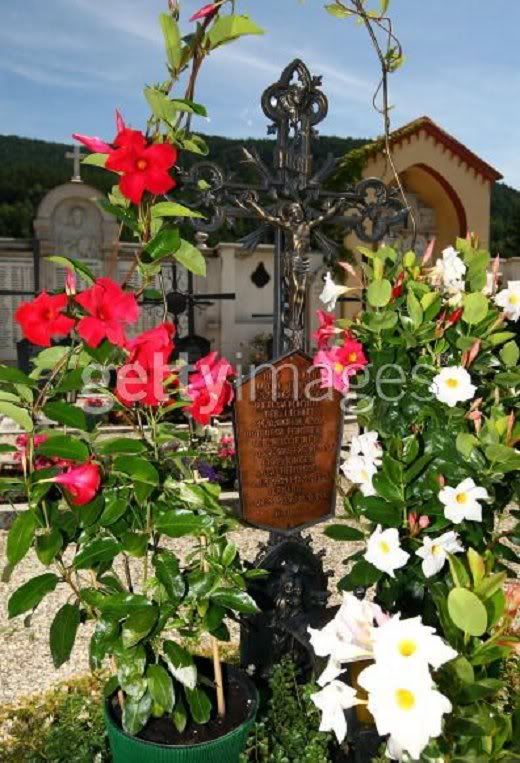 P.S. #2
P.S. #2
8/3/08
HO-HO-HO!!! It now turns out that all the hullaballoo in Oies and about Oies yesterday - which rumor immediately made out to be a papal visit - was due to some local stirring about Magdi Cristiano Allam who arrived for a seminar in Badia. I will post a translation in POPE-POURRI LATER of an article about the Benedettomania in Alto Adige that has given rise to fantasy sightings of the Pope everywhere!
[Modificato da TERESA BENEDETTA 03/08/2008 21:40] |
 03/08/2008 14:27 03/08/2008 14:27 |
|
| | | OFFLINE | | Post: 14.534 | Registrato il: 28/08/2005
| Utente Gold | |
|
 A video-clip of today's Angelus can be seen on Sky-TV's service:
www.skylife.it/videoTg24Single/76932
ANGELUS TODAY
A video-clip of today's Angelus can be seen on Sky-TV's service:
www.skylife.it/videoTg24Single/76932
ANGELUS TODAY
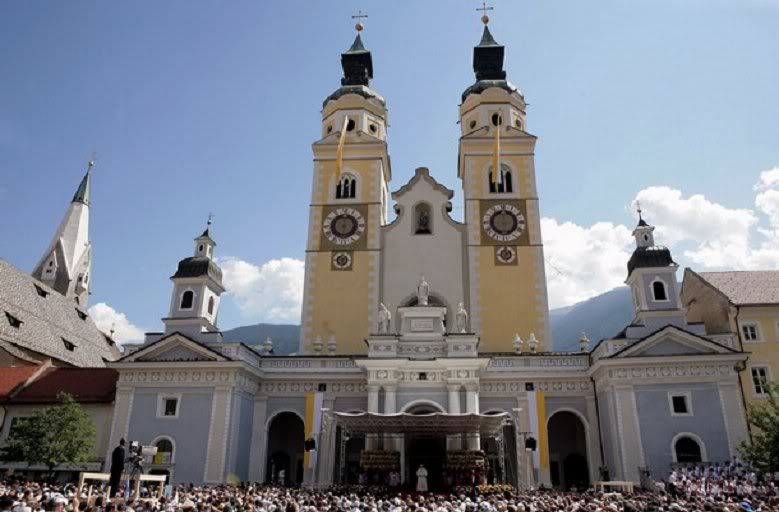
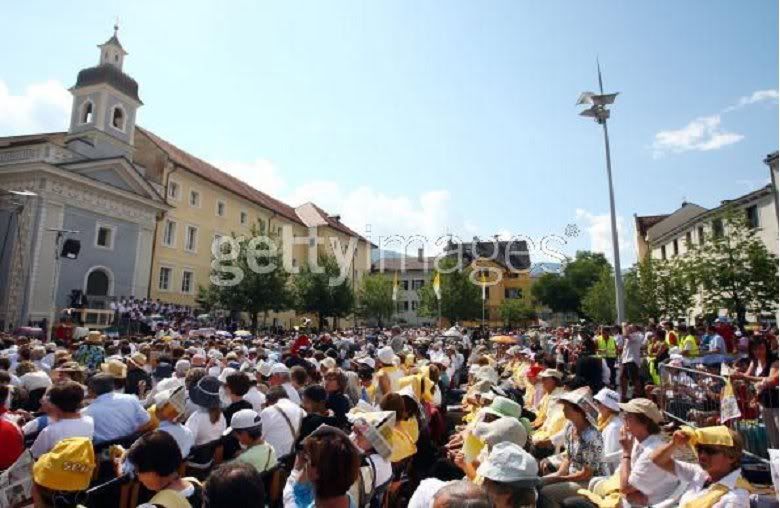
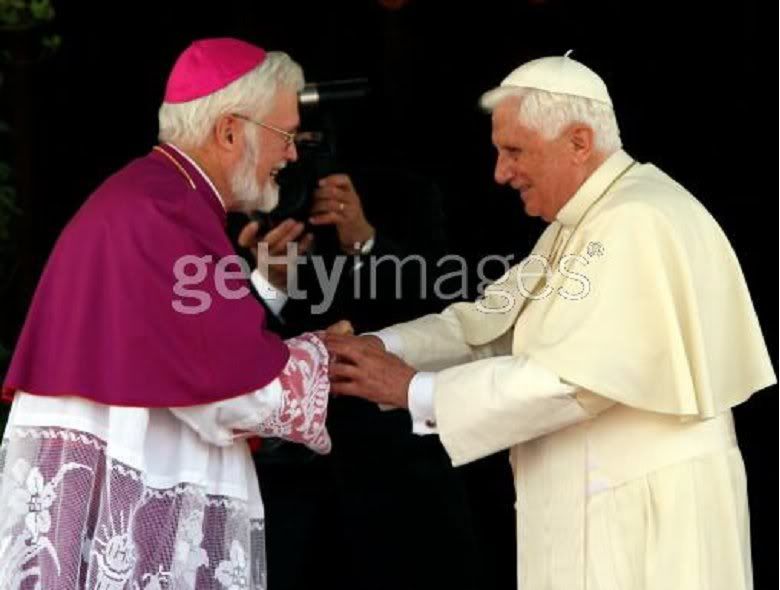 Bishop Egger welcomes the Pope; below, left, Cardinal Bagnasco greeted by the Pope. Bishop Egger welcomes the Pope; below, left, Cardinal Bagnasco greeted by the Pope.
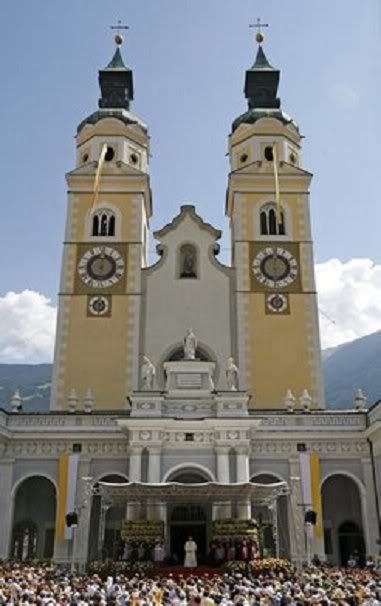 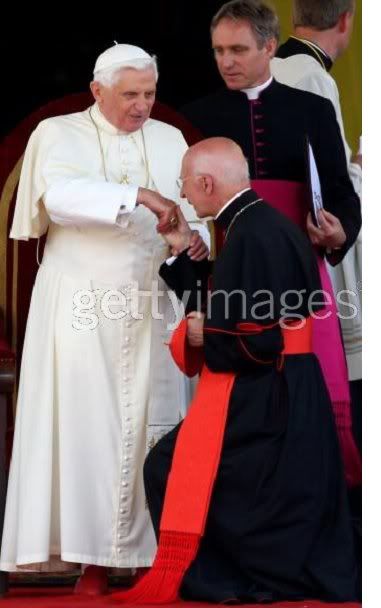
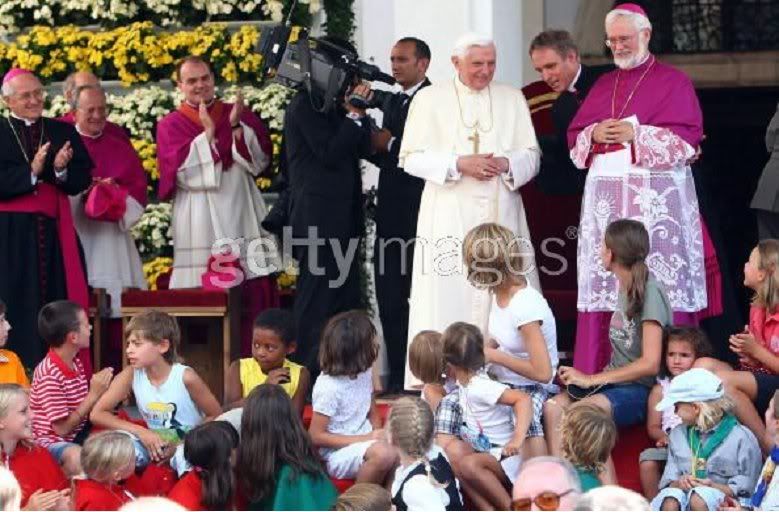 Pope sends greetings to China
Pope sends greetings to China
before Olympics
By DANIELA PETROFF

BRESSANONE, Italy, August 3 (AP) - Pope Benedict XVI sent greetings to China on Sunday before the Olympics and said he hoped the Games would offer an example of coexistence among people from different countries.
He said he will follow the Olympics, which open Friday, with a sense of "deep friendship" and hopes the sports can represent "a pledge of brotherhood and peace among people."
Benedict spoke during the traditional Angelus prayer in Bressanone, a town in the Italian Alps where he is vacationing.
"I follow with deep friendship this great sporting event — the most important and awaited on a world level — and I wish that it offer the international community a valid example of coexistence among people of different background in the respect of common dignity," the Pope told the faithful gathered in Bressanone.
Benedict sent his greetings to China, organizers of the Games and the athletes, expressing hope that "each can give their best in the true Olympic spirit."
Benedict has made the improvement of relations with Beijing a priority of his papacy.
China's officially atheistic Communist Party forced Chinese Catholics to cut ties with the Vatican in 1951, and the two sides have not restored formal relations. Beijing sees the Vatican tradition of the pope naming his own bishops as interference in the country.
China appoints bishops for the state-sanctioned Catholic church. Still, many of the country's estimated 12 million Catholics worship in congregations outside the state-approved church and often are arrested or harassed.
Benedict sent a special letter to Catholics in China last year, praising the underground church, but also urging the faithful to reconcile with followers of the official church.
In his Sunday's address, the Pontiff mentioned the only saint from the area where he is on vacation — a missionary who went to China in the 19th century and died there in 1908. The Pope made the comment in Ladino, the third language of this corner of German-speaking northern Italy.
The Angelus was the Pope's first public appearance of his vacation. It drew some 9,000 people, some dressed in local costumes. Benedict will return to his summer retreat at Castel Gandolfo outside Rome on Aug. 11.
AsiaNews had a more complete report.
Pope has best wishes for Beijing Games,
remembers Paul VI on 30th death anniversary

Bressanone, Aug. 3 (AsiaNews) - Benedict XVI hopes that the Beijing Olympics may offer "to the international community a valid example of coexistence among persons of the most varied origin, in respect of common dignity. May sports once again be a pledge of fraternity and peace among peoples".
The Pope made no reference to the problems surrounding the games in the Chinese capital (freedom of the press, social and environmental questions), nor did he recall the problems that various Christian and other religious communities - including Catholic - still suffer (disappeared bishops, priests in prison, communities prevented from meeting together).
Magnanimously, he addressed "cordial greetings" "to the host country, to the organizers and participants, in the first place to the athletes" and said he is following "this great sporting encounter with profound interest".
But the reflection of today's Angelus, from the square of the cathedral in Bressanone, where he has been on vacation since July 28, was dedicated above all to the memory of Pope Paul VI, who died on August 6, 1978.
"As supreme Pastor of the Church", the pontiff said, "he led the people of God to the contemplation of the face of Christ, Redeemer of man and Lord of history. And the loving orientation of the mind and heart toward Christ was precisely one of the central themes of Vatican Council II, a fundamental attitude that my venerable predecessor John Paul II inherited and presented again with the great Jubilee of 2000.
"At the center of everything, there is always and only Christ: at the center of the Sacred Scriptures and of Tradition, in the heart of the Church, of the world, and of the entire universe.
"Divine Providence called Giovanni Battista Montini from the See of Milan to that of Rome at the most delicate moment of the Council - when the intuition of Blessed John XXIII was in danger of not taking shape. How can we not thank the Lord for his fruitful and courageous pastoral action?
"As our view of the past gradually becomes wider and more complete, the merit of Paul VI appears ever greater, almost superhuman, in presiding over the conciliar assembly, in bringing it to a successful conclusion and managing the eventful post-conciliar phase.
"We could truly say, together with the apostle Paul, that in him the grace of God 'was not in vain' (cf. 1 Cor. 1510): it made good use of his outstanding gifts of intelligence and his passionate love for the Church and for men. While we give thanks to God for the gift of this great pope, let us strive to treasure his teachings".
Before the recitation of the Marian prayer, Benedict XVI recalled that Paul VI himself wanted to pay special honor to the Virgin Mary by proclaiming her "'Mother of the Church' (cf. Insegnamenti, II [1964], 675), an image and model not only of the Christian but, as the holy Fathers teach, of the entire mystical Body of Christ".
At the end of the Angelus, after greetings and good wishes for the Beijing Olympics, the Pope greeted the thousands of pilgrims gathered in the square. Among the various languages, he did not forget greetings in the Ladino language, a Romance language used in the Tyrolean Alps.
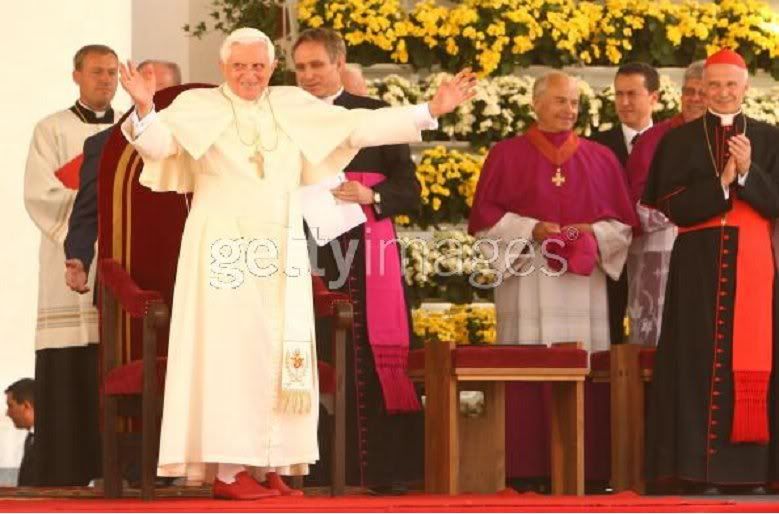
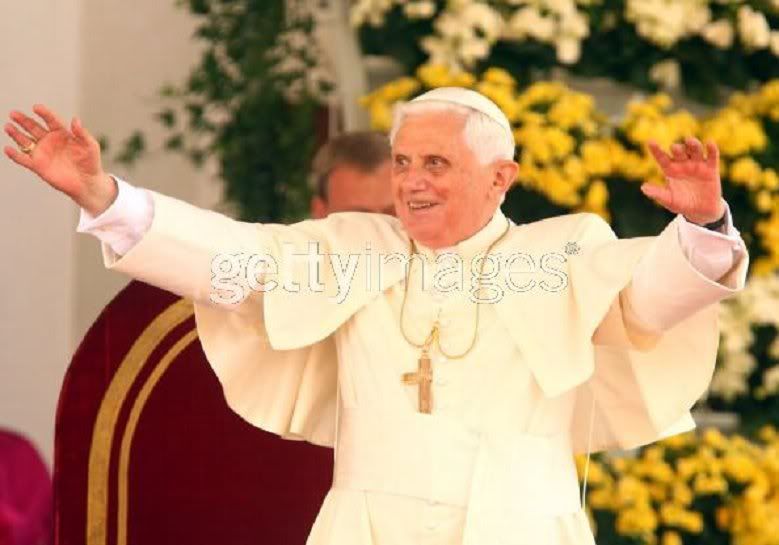
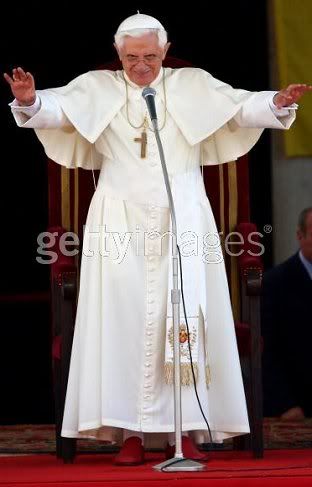 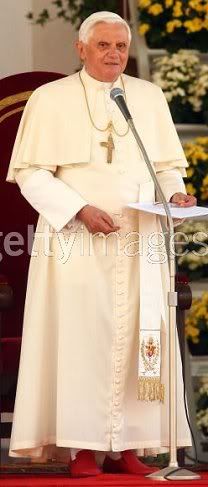 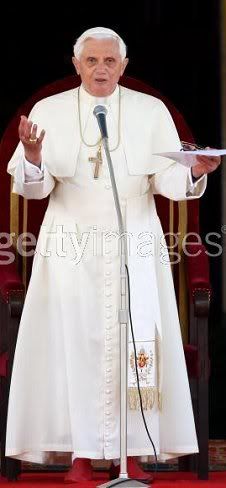 The Italian news agencies reported earlier parts of the Pope's Angelus message, as follows:
Pope says the most important things
The Italian news agencies reported earlier parts of the Pope's Angelus message, as follows:
Pope says the most important things
in life are gifts from God
and cannot be acquired or bought
Translated from

The sun, water, air, like other 'elementary and important' things for man - 'love, friendship, life itself' - cannot be acquired but must be considered gifts of God to man, Pope Benedict said today.
In Bressanone for a 15-day vacation, the Pope, before leading the Sunday Angelus at Piazza Duomo today, made the exhortation in German, the primary language in this trilingual region.
"The Gospel reminds us that the greatest, most elementary and important things in life cannot be acquired or paid for, but can only be received as gifts."
According to the Pope, "this means that they are also things that cannot be taken away and that no dictatorship or power can destroy. We are rich, not poor. And we ourselves should give love, brotherhood, as well as material things."
Thanking the forces of law and order, the authorities and the organizers of his vacation, Benedict XVI added: "And of course, thanks to God himself who has given us this earth and this sunny Sunday."
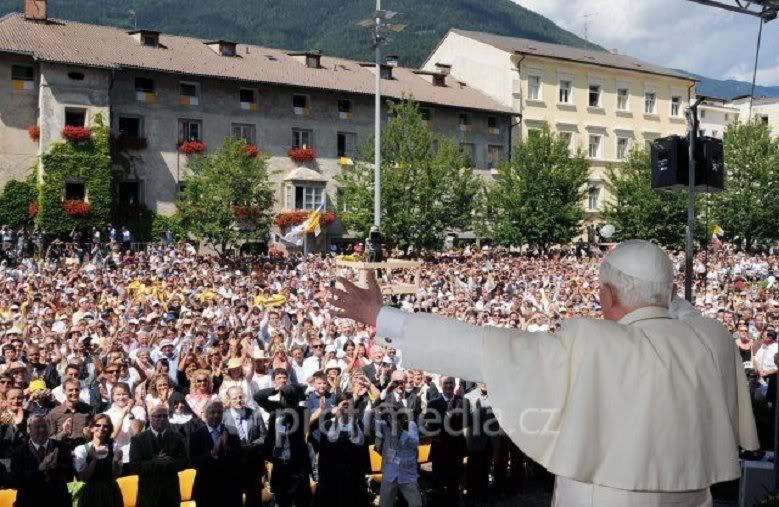 Benedict XVI praises Paul VI
Benedict XVI praises Paul VI
for carrying on and bringing
Vatican-II to a happy end
Translated from

At the Angelus today, Papa Ratzinger paid tribute to the memory and merits of Papa Montini (Paul VI) and his vision of the Second Vatican Council.
Remembering his predecessor on the 30th anniversary of his death (August 6, 1978), Benedict XVI said during his Angelus message today that "Paul VI's merit appears ever greater, and almost superhuman, in presiding over Vatican-II, in carrying it to a happy ending and in governing the agitated post-Conciliar years."
 again again:
It was thanks to Paul VI that the Second Vatican Council (1962-1965) proceeded unhindered, Benedict XVI underscored today, a few days before the 30th anniversary of Papa Montini's death, praising the key role of the Pontiff - less popular than John XXIII, who had convoked and opened the Council - but nonetheless responsible for its prosecution.
"Divine Providence," said Benedict XVI, "called Giovanni Battista Montini from the See of Milan to that of Rome at the most delicate moment for the Council, when the inspiration of the blessed John XXIII risked not taking shape."
"As we look back at the past with a wider and more knowing perspective," he added, "Paul VI's merit appears ever greater, almost superhuman, in presiding over the Council, in leading it to a happy ending, and in governing the agitated post-Conciliar phase."
* * * * * * * * * * * * * * * * * * * * * * * * * * * * * * * * * * * * * * * * * * * * * * * * * * * * * * * *
Speaking of the Olympics, this is not about Pope Benedict, but there's synchronicity somewhere, as Jung calls it:
Catholic bishop carries
Olympic torch in China relay

Beijing, Aug 3, 2008 (CNA).- A Chinese Catholic bishop carried the Olympic torch on its way to Beijing on Thursday as the Chinese government tries to express its appreciation for the Church’s active participation in social affairs and to show progress in its religion policies.
Peter Fang Jianping, Coadjutor Bishop of Tangshan, took part in the July 31torch rally in Tangshan, a city about 110 miles from Beijing. Bishop Fang was the eighth of 208 torch bearers during the last leg of the relay in Hebei, the province surrounding Beijing.
The 45-year-old bishop told UCA News on Friday that he was named a torchbearer because of the Chinese government’s progress in its religious policies and in expressing concerns over religious issues to religious leaders, but also “because of the Church's contribution to the society.”
Bishop Fang said the Diocese of Tangshan, which has about 45,000 Catholics and 40 priests, donated money and materials worth about $22,000 to earthquake relief in Sichuan. An earthquake measuring 8.0 in magnitude struck the province of Sichuan on May 12, causing at least 69,200 confirmed deaths and leaving more than 18,000 still missing.
According to the bishop, many local Catholics who saw the live TV broadcast of the Olympic torch relay told him they were overjoyed and heartened to see their bishop take part in the event.
Torchbearers are allowed to keep their torch as a souvenir after their relay run. Bishop Fang told UCA News he will keep his “precious spiritual legacy.”
Bishop Fang, a native of Hebei, was ordained a priest in 1989 and ordained a bishop in Beijing in 2000 without papal approval. The Holy See legitimized his episcopal status in 2002.
The Beijing Olympics will begin on August 8.
The inclusion of a Catholic bishop among the torchbearers may have been nothing more than token acknowledgment of Catholicism in China in an event of global interest, but an acknowledgment nevertheless.
* * * * * * * * * * * * * * * * * * * * * * * * * * * * * * * * * * * * * * * * * * * * * * * * * * * * * * * *
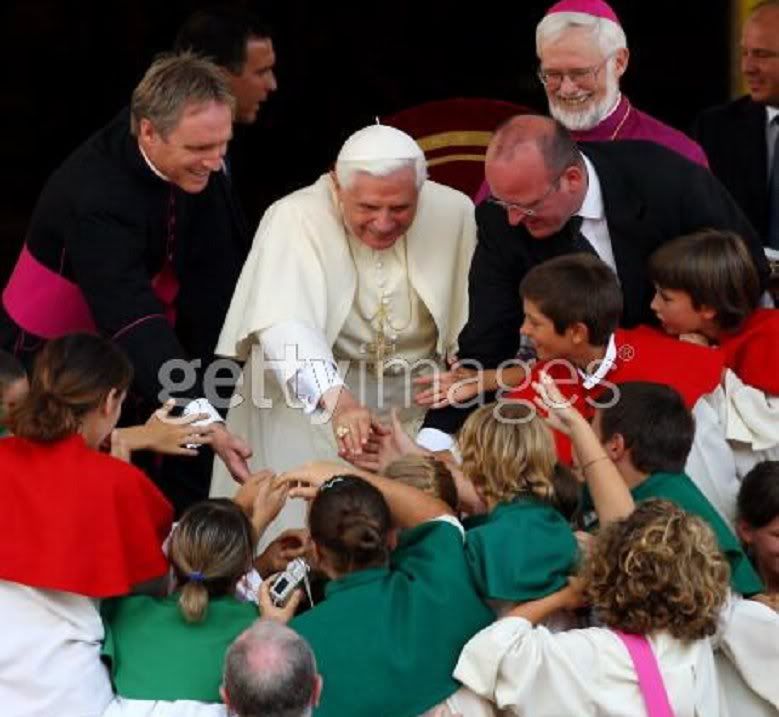
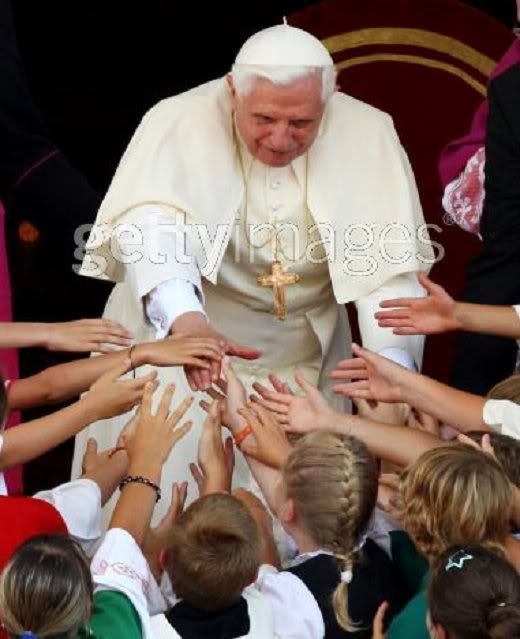 Almost 8 hours since the Angelus at bressanone today, and so far the newsphoto services on Yahoo have only released this photo:
Almost 8 hours since the Angelus at bressanone today, and so far the newsphoto services on Yahoo have only released this photo:
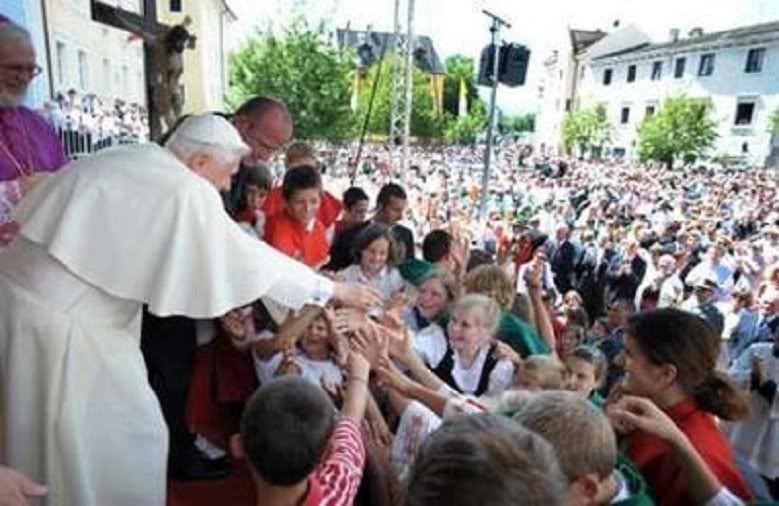 Likewise, the Vatican has not yet posted the text of the Holy Father's message today. Here is additional news from the Italian news agencies:
The Pope is writing
Likewise, the Vatican has not yet posted the text of the Holy Father's message today. Here is additional news from the Italian news agencies:
The Pope is writing
and resting well, Fr. Lombardi says;
Benedict greets aged and sick
in parish church after Angelus

BRESSANONE, August 3 (AGI) - Benedict XVI is working on the second volume of his book, JESUS OF NAZARETH, and on his addresses for his trip to Paris and Lourdes next month, according to Fr. Federico Lombardi, Vatican press director.
Speaking to newsmen after today's Angelus, Fr. Lombardi said: "The Pope is well and resting well. He has not left the Seminary till today, but we expect more movement in the next few days."
Most likely, the earliest opportunity will be Tuesday, since tomorrow, he will be meeting with Cardinal Tarcisio Bertone, his Secretary of State, who is coming to Bressanone for this purpose.
On Wednesday, August 6, the Pope is scheduled to meet with the clergy of the diocese at the Bressanone Cathedral, after saying Mass with them.
After the Angelus today, attended by a crowd of about 10,000 in Cathedral Square, the Pope walked over to the parish church next to the Cathedral where he was awaited by about a thousand people, mostly aged, sick or disabled.
He spoke to them briefly in German and Italian, recalling how he had often come to this church in the past to attend concerts in a place he considers 'has special closeness to the Lord'.
Before leaving, he asked the people of the parish to also 'pray for me'. He then walked back to the Seminario Maggiore where he is staying.
Paparatzifan has posted some pictures that appear to have been taken as the Pope walked back to the seminary. He is flanked in the first photo by Mons. Egger and by Fr. Ivo Muser, rector of the Seminario Maggiore. Not incidentally, I think the man seen behind Mons. Egger in two of the photos is Paolo, the Pope's valet.
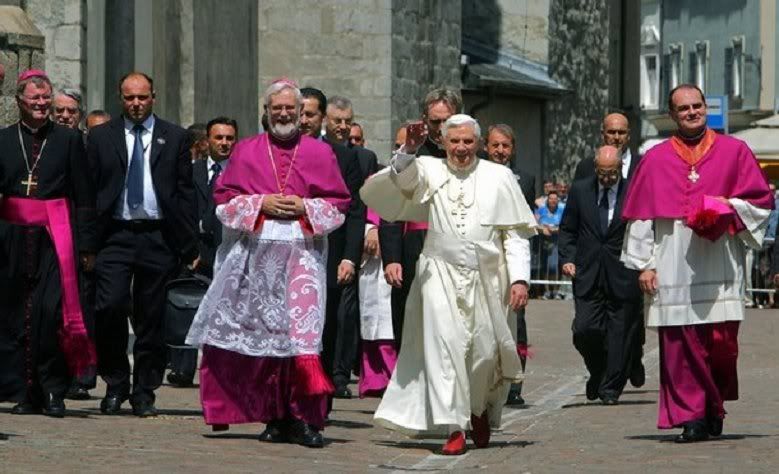
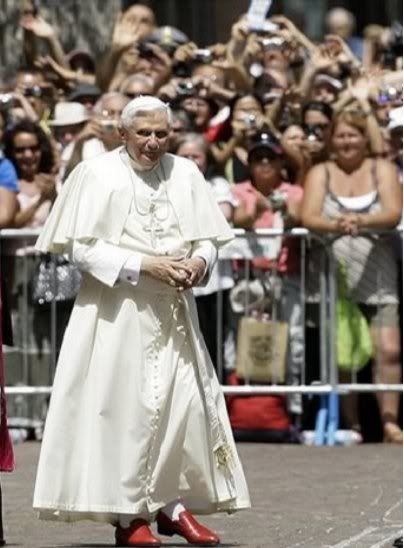 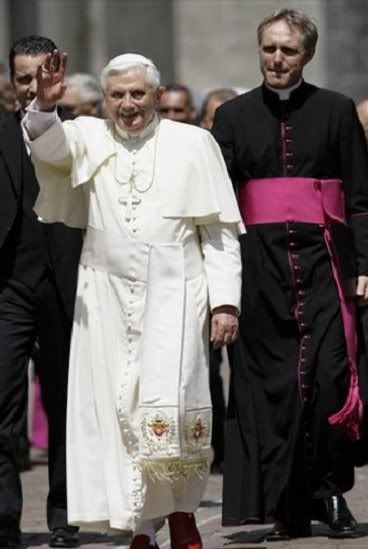
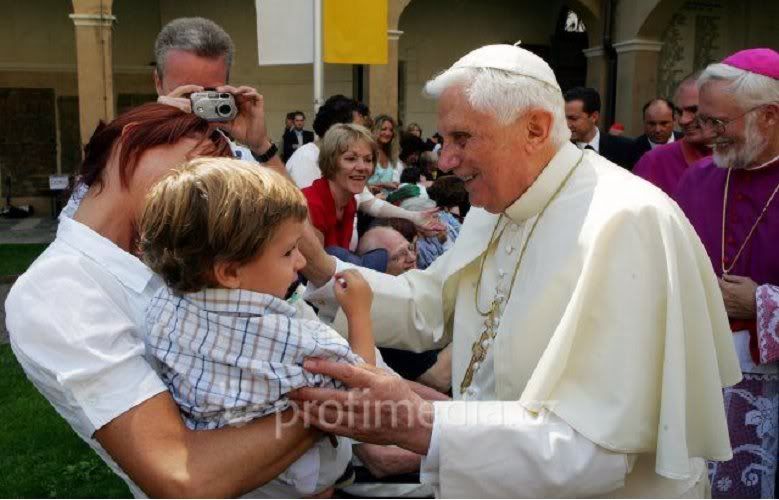
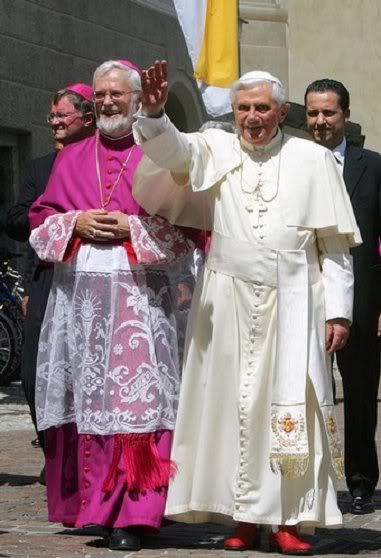 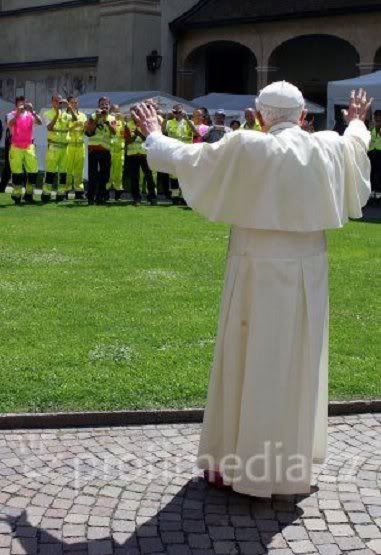 And look how 'fired up' Papino was as he walked through the famous Cloister on his way to the Cathedral this morning:
And look how 'fired up' Papino was as he walked through the famous Cloister on his way to the Cathedral this morning:
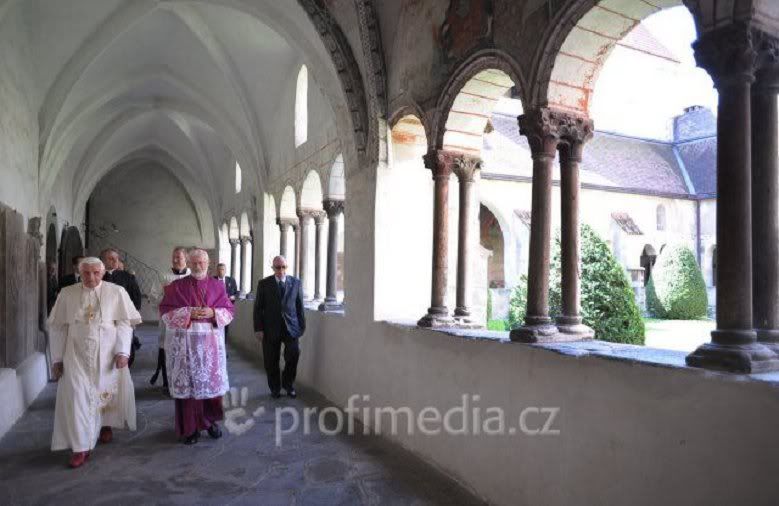 At what point did he stop to look at the bronze array of Bressanone's bishop-princes?
At what point did he stop to look at the bronze array of Bressanone's bishop-princes?
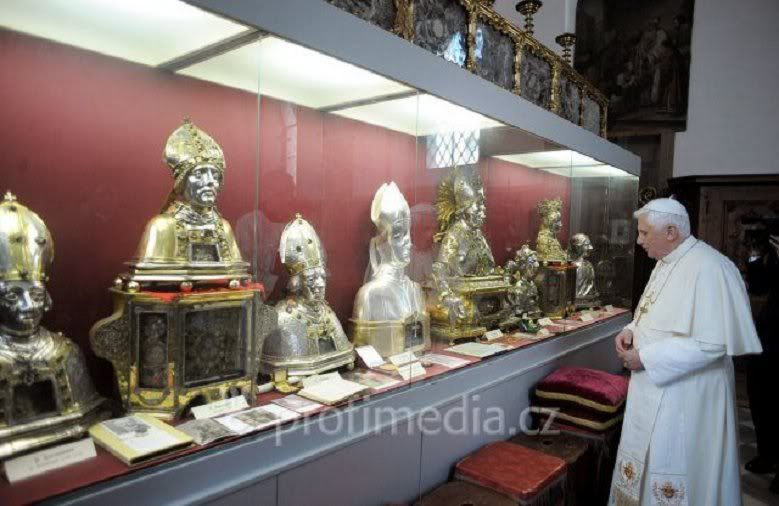 About Benedict the baby magnet: Where was it I read a cardinal who knows the Pope well saying that when Benedict was a Cardinal, he avoided being photographed kissing babies in St. Peter's Square because he thought that gesture in that setting was a Papal prerogative?
About Benedict the baby magnet: Where was it I read a cardinal who knows the Pope well saying that when Benedict was a Cardinal, he avoided being photographed kissing babies in St. Peter's Square because he thought that gesture in that setting was a Papal prerogative?
Such exquisite delicadeza (the Spanish term for a finely nuanced sense of what is correct, right, proper)!

[Modificato da TERESA BENEDETTA 04/08/2008 01:44] |
 03/08/2008 20:37 03/08/2008 20:37 |
|
| | | OFFLINE | Post: 423 | Registrato il: 24/11/2005
| Utente Senior | |
|
I am not suprised that the AP story about a possible visit to Syria did not include these quotes:
"I immediately wrote to the Holy Father to ask for a clarification after the words he was reported to have said in Regensburg," the Grand Mufti said, "and he answered me, explaining the sense of his entire intervention. It was really an academic lecture but it was presented in the media as an attack against Islam."
...
However, taking the Regensburg episode almost as a model - to which he adds the great dispute that had provoked a crisis between the West and Islam before Regensburg (over the Danish cartoons on Mohammed) - the Grand Mufti did not spare words against "the press and the journalists (who) wrote falsehoods to foment inter-religious hatred with the clear intent to denigrate Islam and religion."
Thank you for posting those details from La Repubblica & for the Angelus pictures/news reports. Its interesting to note that he walked back to the seminary. Hopefully we will get more pictures when he meets with Cardinal Bertone & if he decides to go out on Tuesday.
|
 03/08/2008 21:14 03/08/2008 21:14 |
|
| | | OFFLINE | | Post: 14.538 | Registrato il: 28/08/2005
| Utente Gold | |
|
BEING REALISTIC ABOUT CHINA
AND THE OLYMPICS
In the light of Pope Benedict's expression of good wishes today for the Olympic Games in Beijing, Father Bernardo Cervellera, editor of AsiaNews, has just posted in the agency's Italian service a lengthy denunciation of China's ambivalent, if not duplicitous, actions regarding freedom of expression and access to information during the Games.
While his commentary is obviously not a direct reproach to the Pope, the second sentence in the AsiaNews report on the Pope's Angelus message from Bressanone today did say pointedly:
The Pope made no reference to the problems surrounding the games in the Chinese capital (freedom of the press, social and environmental questions), nor did he recall the problems that various Christian and other religious communities - including Catholic - still suffer (disappeared bishops, priests in prison, communities prevented from meeting together).
We can all share the outrage against China of Fr. Cervellera and other men of goodwill who are concerned about respect for human rights everywhere and anywhere - and who can doubt that the Pope, more than perhaps any of us, feels it most profoundly? - because China has clearly not been sincere about respecting human rights.
Its government has made clear repeatedly that it will always choose repression, if it feels that its interests are directly affected by expressions of dissent or by the free exercise of human rights.
[As soon as the English translation of Fr. Cervellera's piece is available, I will post it, as he has an updated report on the latest questionable actions taken by the Chinese government on the very eve of the Olympics.]
However, I do believe that if Pope Benedict XVI today chose to focus only on the positive with respect to the Olympic Games, perhaps it is because he also has the pragmatic view that 1) the Olympic Games are not about politics but about sports and the people involved in it - the best athletes of the globe who have each spent their lives preparing for these competitions; and that 2) the legitimate political concerns about China's repressive policies can be pursued on a different track (as the Vatican must be doing behind the scenes) and not publicly mixed up with the Olympics - after all, we are only talking of a three-week time frame here, at the most.
President Bush, who is attending the opening of the Games, has rejected critics who say that his presence would represent an indirect support for the Chinese government and all its policies. It most certainly does not - any more than meeting with Chinese leaders during international conferences is.
He has made it clear that his presence is in support of the men and women who make up the Games, and that he intends to pursue his advocacy of universal respect for human rights in private talks with the leaders of China while he is there - not to use the occasion to publicly embarass China's leaders. At the same time, he means to affirm the right to religious expression by making it a point to attend Sunday services in Beijing while he is there.
China won the bid to host the 2008 Summer Olympics in a fair and free way under the rules of the International Olympic Committee. Perhaps the IOC was too gullible in its unquestioning acceptance of the guarantees on freedom and respect for human rights made by China as required from the winning bidder. But that's water under the bridge.
The Chinese are hosting the Games - boycotting them and calumniating them for the next three weeks is not going to advance the cause of human rights one whit. That sort of pressure has not worked in six decades. It's not suddenly going to work this month.
The Chinese tiger won't lose its stripes overnight to accommodate human rights advocates - not even for three brief weeks in August. But the pressure of international opinion may yet lead China's leaders to announce or do something 'dramatic' in this respect during the Games. Who knows?
Meanwhile, it is unrealistic to hold one's breath for a sudden human rights epiphany in Beijing, and we should all join the Holy Father in praying not just for the well-being of the competing athletes and the success of the Games but also for such an eventual epiphany to happen - and may it be soon.

P.S. It's been 12 hours since the Angelus, and the Vatican has still not posted the Angelus text. As it's Sunday midnight now in Italy, we obviously won't get the text until noon tomorrow, Monday. In the Internet age, there's no excuse for this sort of delay.
[Modificato da TERESA BENEDETTA 04/08/2008 01:46] |
 04/08/2008 05:45 04/08/2008 05:45 |
|
| | | OFFLINE | | Post: 14.541 | Registrato il: 28/08/2005
| Utente Gold | |
|
   Benedict XVI's good wishes
Benedict XVI's good wishes
for Beijing and the Olympics
by Bernardo Cervellera
Editor

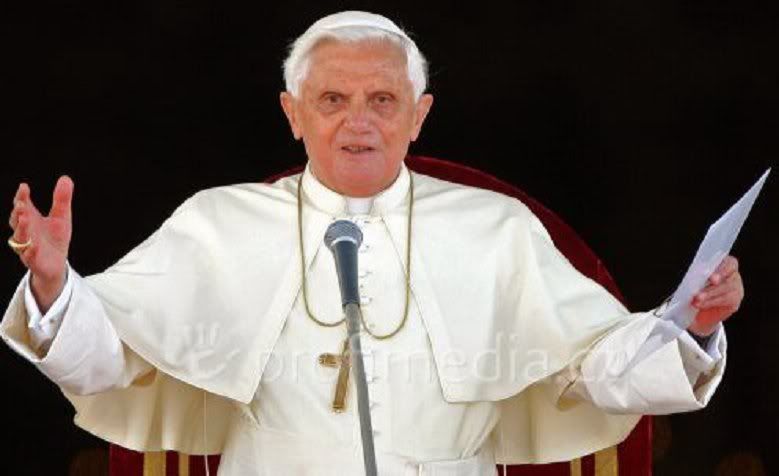
Rome, August 3 (AsiaNews) - Five days from the Beijing Games, Benedict XVI "blessed" the Olympics and its host country; in the meantime, many international Catholic websites (including those of Vatican Radio, the diocese of Hong Kong, and AsiaNews) remain blocked, and a number of bishops and priests are in prison.
At today's Angelus, in the church square of Bressanone, where he is on vacation, the Pontiff expressed his hope that the "great sporting encounter" of the Beijing Olympics "may offer to the international community a valid example of coexistence among persons of the most varied origin, in respect of common dignity. May sports once again be a pledge of fraternity and peace among peoples".
And he said he was "happy to address to the host country, to the organizers and participants, in the first place to the athletes", his "cordial greetings".
Benedict XVI used similar words of greeting and good wishes last May 7, after the famous concert performed at the Vatican by the Beijing Philharmonic Orchestra.
Many spontaneously wonder whether, behind the Pope's "caress" of Beijing, there have been significant strides toward diplomatic relations between the Holy See and China. Some time ago, a few of the Hong Kong newspapers ran stories that there would be an exchange of ambassadors during the Games.
The situation on the ground does not allow this kind of optimism. In recent days, the foreign journalists in Beijing have criticized Chinese censorship of websites, and accused the International Olympic Committee of complicity.
Thanks to pressure from the entire world, China has relaxed the restrictions, allowing members of the foreign media to connect to the BBC, Amnesty International, and the Hong Kong newspaper Apple Daily.
But - as is well known - the elimination of censorship applies only to the Olympic Village, and not to all of China. Moreover, according to information obtained by AsiaNews, various international Catholic websites remain blocked.
These include the websites of Vatican Radio (www.radiovaticana.org), the diocese of Hong Kong (www.catholic.org.hk), the Jesuits of Macau and Hong Kong (www.jesuitas.org.hk), the foreign missions of Paris to Singapore (www.zhonglian.org), the Korean Church (www.chonjinam.or.kr), AsiaNews (www.asianews.it), and a Catholic website in Malaysia (www.evland.com/bbs).
There are also problems on the front of actual religious freedom. The Chinese press is reporting that everyone at the Olympic Village will be given a book of the Gospels and a bible in Chinese and English; but just two months ago, the pilgrimage to Sheshan was banned in all the dioceses of China (except for the diocese of Shanghai).
Attention has also been given to the news that the official coadjutor bishop of Tangshan (Hebei), Bishop Peter Fang Jianping, has been chosen to carry the Olympic torch on its journey toward Beijing. But it is in Hebei that the most violent cases of religious persecution have been seen:
- Bishop James Su Zhimin (diocese of Baoding, Hebei), 74, was arrested in 1996 and has not been heard from since. In November of 2003, he was seen under police surveillance at the hospital of Baoding, where he received care for his heart and his eyes. But he disappeared again after a few days;
- Bishop Cosmas Shi Enxiang (diocese of Yixian, Hebei), 85, was arrested on April 13, 2001, and disappeared. Bishop Shi was ordained a bishop in 1982. He had been in prison for 30 years. The last time, he was arrested in December of 1990, and released in 1993. Since then, he was living under forced isolation until his latest arrest;
- At least eight priests of Hebei are under arrest, in prison or the work camps. They include the administrator of the diocese of Baoding, Fr Joseph Lu Genjun, 47, who was arrested on February 18, 2006, together with Fr Paul Huo Junlong, 52. Both are detained in unknown locations, without any trial or specific accusations.
To these cases must be added those of house arrest, and the inability to exercise their ministry on the part of dozens of underground bishops.
It is true that in this pre-Olympic period, many underground communities seem to be enjoying a strange sort of freedom: they are able to celebrate Mass publicly without any arrests; there have been no illicit ordinations supported by the Party but not by the Vatican.
The impression, however, is that these gestures are dictated more by the concern for preserving tranquility during the Olympics, in front of the international community, than by a real change in China's religious policy.
In fact, it seems that there is a sort of schizophrenia in the Beijing leadership, between those who want diplomatic relations with the Holy See and those who, according to Stalinist and Confucian tradition, do not admit any religious expression outside of government control.
The main representative of this sickness is Ye Xiaowen, director of the state administration for religious affairs.
Last February, Ye Xiaowen, on a visit to Washington, talked about the signs of hope between China and the Vatican. One month later, in an interview with a Chinese newspaper, he returned to the old Maoist accusations against the Pope, calling the Vatican two-faced and saying it was necessary to boost the patriotism of the bishops and the Church [1].
Curiously, rumors and signals of progress in relations between China and the Vatican emerge from the Chinese above all at critical moments for Beijing's international image.
So, after Steven Spielberg refused to participate in preparations for the Olympics, there were the positive statements from Ye; after the repression in Tibet, news came that there would be a concert of the Beijing Philharmonic Orchestra at the Vatican (May 7): relaxation of tensions with the Vatican seems to be the publicity card to play at critical moments, for the sake of being accepted by the international community, precisely when it is speaking out the loudest against China.
On the part of the Vatican, there is openness and the hope that all of these signs may lead to a good final result. It must be said that if Vatican diplomacy seems to accept a passive role of acceptance - and sometimes of silence - this is not true of Benedict XVI, who is still waiting for an official reply to his letter sent to the Chinese Catholics last year. [As the letter was addressed to the Catholics of China, I don't think the Vatican expects an 'official reply' from the Chinese government!]
One must wait until the Games are over to see the direction in which the Beijing government wants to move. The occasion may be the synod of bishops, scheduled for October 2008 in Rome, to which - in all likelihood - Benedict XVI will invite some of the Chinese bishops.
In 2005, at the synod on the Eucharist, he had invited for bishops from China, but the government did not give any of them permission to leave the country to go to Rome.
[1] Cf. AsiaNews.it, 22/2/2008 and 21/3/2008.
|
 04/08/2008 15:36 04/08/2008 15:36 |
|
| | | OFFLINE | | Post: 14.547 | Registrato il: 28/08/2005
| Utente Gold | |
|
Strange response to Vatican's
rectification of history:
Spain's Knights Templar heirs
sue the Pope
By Fiona Govan

MADRID, August 4 - The Association of the Sovereign Order of the Temple of Christ, whose members claim to be descended from the legendary crusaders, have filed a lawsuit against Benedict XVI calling for him to recognise the seizure of assets worth 100 billion euros (£79 billion).
They claim that when the order was dissolved by his predecessor Pope Clement V in 1307, more than 9,000 properties as well as countless pastures, mills and other commercial ventures belonging to the knights were appropriated by the Church.
But their motive is not to reclaim damages, only to restore the "good name" of the Knights Templar. [But did not the Vatican disclosure last year of newly-found historical records do just that? And why the delayed reaction?]
"We are not trying to cause the economic collapse of the Roman Catholic Church, but to illustrate to the court the magnitude of the plot against our Order," said a statement issued by the self-proclaimed modern-day knights.
The Templars were a powerful secretive group of warrior monks founded by French knight Hugues de Payens after the First Crusade of 1099 to protect pilgrims en route to Jerusalem.
They amassed enormous wealth and helped to finance wars waged by European monarchs, but spectacularly fell from grace after the Muslims reconquered the Holy Land in 1244 and rumours surfaced of their heretic practices.
The Knights were accused of denying Jesus, worshipping icons of the devil in secret initiation ceremonies, and practising sodomy.
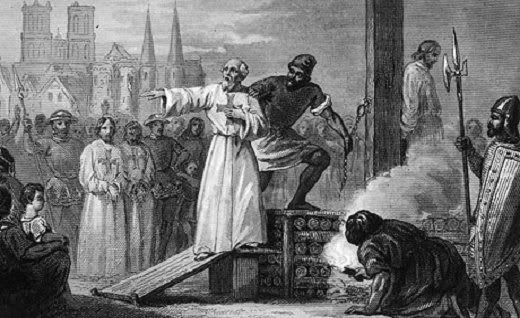 Jacques de Molay, Last Grand Master of the Knights Templar, is led to the stake to burn for heresy.
Jacques de Molay, Last Grand Master of the Knights Templar, is led to the stake to burn for heresy.
Many Templars confessed to their crimes under torture and some, including the Grand Master Jacques de Molay, were burned at the stake.
The legal move by the Spanish group comes follows the unprecedented step by the Vatican towards the rehabilitation of the group when last October it released copies of parchments recording the trials of the Knights between 1307 and 1312.
The papers lay hidden for more than three centuries having been "misfiled" within papal archives until they were discovered by an academic in 2001.
The Chinon parchment revealed that, contrary to historic belief, Clement V had declared the Templars were not heretics but disbanded the order anyway to maintain peace with their accuser, King Philip IV of France.
[The above story was duly posted in the thread on CULTURE & POLITICS at the time.]
Over the centuries, various groups have claimed to be descended from the Templars and legend abounds over hidden treasures, secret rituals, and their rumoured guardianship of the Holy Grail.
Most recently the knights have fascinated the modern generation after being featured in the film 'Indiana Jones and the Last Crusade' and Dan Brown's novel The Da Vinci Code.
Perhaps the Spanish courts will see this for the nuisance suit that it is. And isn't there a statute of limitations on alleged crimes committed seven centuries ago?[Modificato da TERESA BENEDETTA 04/08/2008 15:39] |
 04/08/2008 15:48 04/08/2008 15:48 |
|
| | | OFFLINE | | Post: 14.548 | Registrato il: 28/08/2005
| Utente Gold | |
|
 POPE TAKES FIRST EXCURSION
POPE TAKES FIRST EXCURSION
OF HIS VACATION -
GIVES THE SLIP TO ALL WATCHERS!
First the news! Just a quick summary - everything known, actually - from the brief reports filed so far by ANSA and Apcom, and confirmed by Fr. Lombardi in an interview with Vatican Radio.
Benedict XVI did finally make his first excursion outside the city center of Bressanone yesterday evening around 6 p.m.
He and his brother visited the nearby village of Sant'Andrea, in the mountains above Bressanone, to visit the tomb of a missionary friend, Anton Agreiter, who died in 2003.
No one expected it, and apparently only a few children who were playing near the cemetery saw him. Afterwards, the Pope and his brother walked for about 45 minutes in the surrounding woods.
Father Lombardi also told Vatican Radio that on Tuesday, the Holy Father will definitely visit St. Joseph Freinademetz's shrine in Oies, Val Badia.
Cardinal Tarcisio Bertone arrived midday Monday at the Seminario Maggiore in Bressanone and was expected to stay for a few hours in conversations with the Holy Father.
The Vatican has now posted the text of yesterday's Angelus messages as well as the Pope's brief remarks to the faithful in St. Michael's parish church afterwards.
I have posted a full translation in AUDIENCE & ANGELUS TEXTS.
Lella says in her daily review of the Italian national press that none of them reported what the Holy Father said yesterday about Paul VI - which was almost half of his main message. Like the AP yesterday, they only reported what the Pope said about the Olympics, part of his post-Angelus greetings, which he sometimes precedes with a special message.
The Pope's Angelus messages are generally rather brief, so I have always wondered why the news reports rarely do justice to the full mini-homily, for that is what they are. Even AsiaNews falls into the secular media trap of reporting the Pope's discourses as they would a politician's speech.
How different it always is to read the Pope's full text when compared to the news reports! - which generally ignore not just the context of what he says, but important things he says (like his tribute toPaul VI) when the reporter has no interest in them (or thinks that the reading public would have no interest).
For instance, none of the Italian news agency reports about the Pope's words yesterday on the gifts of God that man cannot buy pointed out that they were inspired by the two Readings and Gospel of the day - as homilies are meant to be, and as, of course, the Pope explicitly points out.
The obvious omission by the AP report of the Holy Father's reference to Paul VI - and the failure of the Italian MSM to even report it - is something else. It is probably not so much a disinterest in Paul VI (because of the notion that the public, even Catholics, are not much interested in him), although there is that - he was never the media darling that John XXIII or John Paul II were.
It may have something to do with the MSM line [being the dominant liberal cultural thinking] that Benedict XVI, for all that he was an active participant in Vatican-II, has really acted 'against' it ever since. Because he has not been on the side of the progressivist 'spirit of Vatican-II' advocates of rupture. Because his interpretation of Vatican-II as 'renewal in continuity' is seen by these liberals as an attempt at 'restoration of the pre-conciliar Church', the main accusation against him after he came out with The Ratzinger Report, and fuelled for them by his increasing use of certain traditions in liturgy that had been swept aside by the post-Vatican-II liturgical reformists.
So why would they publicize him singing the praises of the Pope who did preside and conclude Vatican-II? It spoils their script.
[Modificato da TERESA BENEDETTA 04/08/2008 21:04] |
 05/08/2008 03:04 05/08/2008 03:04 |
|
| | | OFFLINE | | Post: 14.552 | Registrato il: 28/08/2005
| Utente Gold | |
|
 There really is nothing to add to what we knew as of this morning about the Holy Father's vacation,
There really is nothing to add to what we knew as of this morning about the Holy Father's vacation,
except a picture showing the Pope with Cardinal Bertone in Bressanone earlier today in an inside page
of the August 4-5 issue of L'Osservatore Romano.
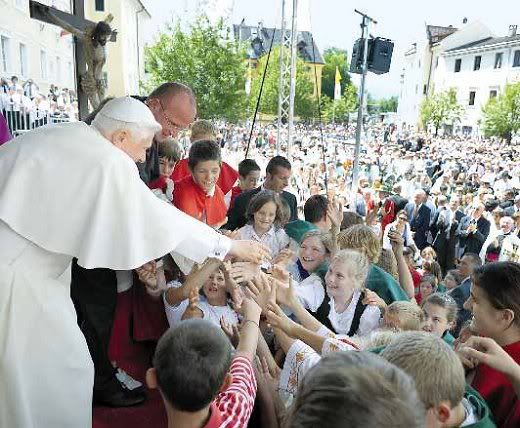 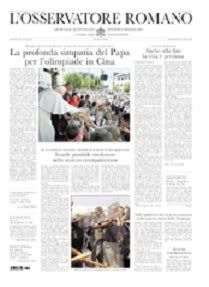 The front page leads off with the Pope's message about the Olympics in yesterday's Angelus message, and a picture from yesterday. The complete text of the Pope's Angelus homily, special message and greetings is published in full, along with the brief remarks he gave to the people who assembled in St. Michael parish church next to the Bressanone Cathedral, after the Angelus yesterday; with a separate article about the Pope's tribute to Paul VI on the 30th anniversary of his death on August 6.
The front page leads off with the Pope's message about the Olympics in yesterday's Angelus message, and a picture from yesterday. The complete text of the Pope's Angelus homily, special message and greetings is published in full, along with the brief remarks he gave to the people who assembled in St. Michael parish church next to the Bressanone Cathedral, after the Angelus yesterday; with a separate article about the Pope's tribute to Paul VI on the 30th anniversary of his death on August 6.
There is only one brief item about the Pope's vacation - an omnibus one - as follows:
Praying at the tomb
of a missionary friend
Translated from
the August 4-5 issue of

The applause of 10,000 faithful in Bressanone's Cathedral Square broke several times into the words of Benedict XVI at his first Angelus from the mountains of Alto Adige.
Sunday, August 3, was a very intense day for the Pope who led the Marian prayer after a greeting from Bishop Wilhelm Egger, in German, Italian and Ladino, the old Romance language still widely used in the region. The prelate had celebrated Mass before the Angelus.
The Pontiff, after having given his greetings in various languages - with a particular reference to Josef Freinademetz, the Alto-Adige saint who was a missionary in China - spent some time chatting with Cardinal Angelo Bagnasco, Archbishop of Genoa and president of the Italian bishops conference, Cardinal Crescenzio Sepe, Archbishop of Naples, some bishops, and a representative group of nuns and laymen. [Other newspapers said both cardinals are in Alto Adige because both happen to be spending a holiday at the monastery in the Marian shrine of Pietralba.]
The Pope then visited the parish church of St. Michael Archangel, and later, he went to the village of Sant'Andrea in the hills above Bressanone, where with his brother, Mons. Georg Ratzinger, he prayed at the local cemetery , at the tomb of their friend Anton Agreiter, who served for a long time as a missionary in Africa and who died in 2003.
There was no picture of the Sant'Andrea visit, and nothing said about
Cardinal Bertone's visit, although the following picture was used:
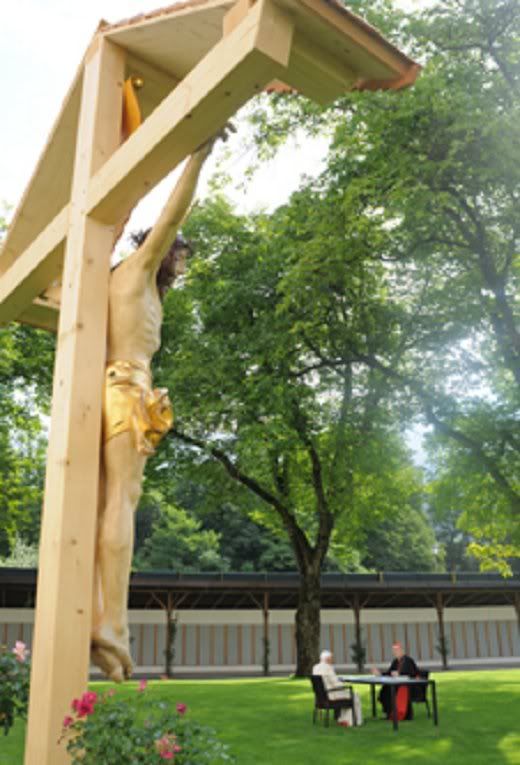
 and  both filed almost identical brief reports both filed almost identical brief reports
about Cardinal Bertone's visit to Bressanone as follows:
Bressanone, August 4 (Translated) - Cardinal Tarcisio Bertone, Vatican Secretary of State, left the Seminario Maggiore around 5:20 this afternoon after spending most of the day with the Pope who is on vacation here.
"We spoke about a lot of things," was all he would say to newsmen.
Bertone arrived around 10 a.m. to update the Pope on the business of the Holy See.
Asked about the Olympic Games in China, Bertone said: "China is an open country. I suggest we all sit back and prepare ourselves for the Olympics, and let's root for the best performers!"
 Meanwhile, here in a few pictures was the 'papal progress' from the Seminario
Meanwhile, here in a few pictures was the 'papal progress' from the Seminario
Maggiore to the Cathedral yesterday morning for the Angelus, passing through
the Cathedral's famous frescoed Cloister:
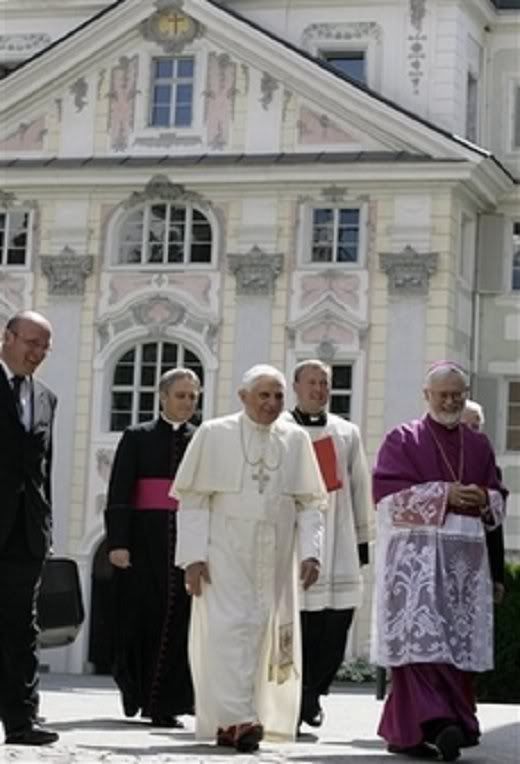

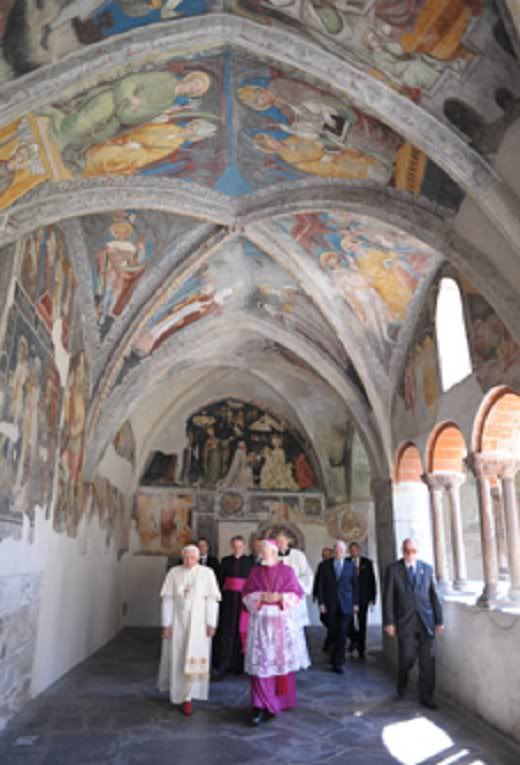

Thanks to Lella's blog: Watch this videoclip
tv.repubblica.it/copertina/le-vacanze-del-papa/22671?video&...
It shows the Pope going from the seminary to the Cathedral for the Angelus - at about 0:40, while greeting some people, he bends to pick up a Vatican flag that a young woman had dropped! He stops at a chapel of the Cathedral to pray, then looks at the display on the bishop-princes of Bressanone. The video then jumps to when he walks ftom the Cathedral to the parish church of St. Michael; then, finally, some shots of him meeting with Cardinal Bertone in the Seminary garden. They have a lot of papers and folders in front of them.
[Modificato da TERESA BENEDETTA 05/08/2008 04:12] |
 05/08/2008 07:49 05/08/2008 07:49 |
|
| | | OFFLINE | | Post: 14.554 | Registrato il: 28/08/2005
| Utente Gold | |
|
Benedict in Arabia?
By Frank Mazzaglia

Posted Aug 03, 2008
Just back from his trip to Australia's Youth Festival, whispers from the Vatican are now centering on a potential trip to Arabia for Pope Benedict.
Earlier this month, Bahrain's King Hamad was the first Arab head of state to invite Pope Benedict XVI during a private audience. A similar invitation last year came from Qatar's prime minister last year.
The visit would be particularly welcomed by a growing number of Christian workers who now make up 35 percent of Bahrain's population. As more and more Muslims move into Christian countries, there is also a reverse immigration movement.
The Christian worker population in the United Arab Emirates has now reached an astounding 80 percent. Even in Kuwait, some 60 percent of the population is comprised of Christians.
The new Christian immigrants come mostly from the Philippines and southern India. In Saudi Arabia alone, there are as many as 1.2 million Filipino Catholics.
None of that means, however, that being a Christian in Arabia is comfortable. There are only 20 parishes in all of Bahrain. Most of the priests in that country are Capuchin friars, and the government won't allow more churches to be built.
If the trip actually takes place, it will be a significant milestone, not just for the Catholic church, but for the world.
Pope Benedict will clearly be interested in prodding the government to allow for the building of more churches. Beyond that, the Church will make a major effort to support Christian workers economically. In what is one of the world's wealthiest regions, unskilled blue-collar foreign workers earn as little as $10 a day which is tantamount to living in squalid conditions that come close to indentured labor or modern day slavery.
Arab governments themselves, with tendencies towards modernity, would also benefit from a papal visit. Saudi Arabia's King Abdullah convened a meeting just this past June of Muslim religious leaders in Mecca to discuss ways to promote interfaith dialogue. This was followed by an interfaith meeting in Madrid with representatives of Christianity and Judaism.
These developments have already resulted in some modest advances towards religious freedom. Private Christian and other non-Muslim worship is now allowed to go unpunished.
If the trip did take place, Pope Benedict XVI would be the first head of the Catholic church to visit the region. Extremists, of course, will oppose it and Arab governments will have another reason to placate or suppress them.
Some say that when Islam built a mosque in Rome, the Vatican should have used that moment to demand more rights for Christian people in Muslim countries. In any case, that opportunity has passed, but the direct intervention of Peter's successor in Arabia on behalf of Christians and Jews would be an important step in improving good will towards Muslims living in foreign countries.
For Pope Benedict himself, the historic visit would give new meaning to his papacy. When he was elected Pope, many observers believed that his advanced age would limit any real progress.
Each Pope has a style of his own, a persona and an agenda, but many said, "Well, he is no Pope John Paul." Indeed, he isn't, but the leader of the world's one billion Roman Catholics is a powerful figure in his own right. In fact, this Pope has already dispelled any concern about his age. A visit to Arabia, however, would have future implications that would benefit the entire world.
From time to time, people wonder whether a Pope is even necessary. Interfaith dialogue about Christian unity often bogs down when it comes to a discussion on the role of the Pope. Medieval popes are raised as examples.
Yet, time and time again, we see how beneficial the role of the Pope can be. Tearing down the Berlin wall and the liberation of Poland are only recent examples.
No wonder that Catholics all around the world still say, "Long live the Pope!"
|
 05/08/2008 13:06 05/08/2008 13:06 |
|
| | | OFFLINE | Post: 1.484 | Registrato il: 27/11/2005
| Utente Veteran | |
|
|
 05/08/2008 14:16 05/08/2008 14:16 |
|
| | | OFFLINE | Post: 3.237 | Registrato il: 23/11/2005
| Utente Master | |
|
Climb Every Mountain
Nice sentiments, Mary, about the private audience for forum members. As it is, I suspect those of our group in Bressanone this week are trekking resolutely through the mountains to be at the little village of the local saint when Papa is scheduled to show up this afternoon. Here's hoping they make it safe and sound and get to see him up close and without a mob around although since Fr. Lombardi talked about it with Vatican Radio, I'm sure a zillion people will suddenly materialize. ![[SM=g27825]](https://im0.freeforumzone.it/up/0/25/7401450.gif)
|
 05/08/2008 14:19 05/08/2008 14:19 |
|
| | | OFFLINE | Post: 3.238 | Registrato il: 23/11/2005
| Utente Master | |
|
Regarding that guy who tried to jump into the popemobile last year, here's what happened to him. Girls, take note. Don't jump into the popemobile.
German court orders treatment over pope incident
August 5, 2008
BERLIN (AP) — A court ordered a German who jumped a security barrier and grabbed hold of Pope Benedict XVI's popemobile last year in the Vatican to undergo treatment but stopped short of sending him to a psychiatric hospital.
Security guards swiftly tackled and pinned the man to the ground following the incident in St. Peter's Square in June 2007.
The 28-year-old, who suffers from a bipolar disorder, was put Monday on four years' probation, the Waldshut-Tiengen state court in southwestern Germany said in a statement.
To avoid being sent to a psychiatric hospital during that period, he must begin psychotherapy and continue with medication he is already taking and undergo regular checkups, the court said.
He also was banned "categorically" from consuming alcohol and drugs, and must undergo regular urine tests, the court said. The man was not identified in the statement, in keeping with German court practice.
It said the man's health has "stabilized significantly" over the year since the incident, and that the conditions attached to Monday's verdict should encourage a further improvement.
The German-born pontiff was not harmed in last year's incident and appeared not to have even noticed. He did not look back and kept on waving and blessing the crowd.
|
 05/08/2008 14:51 05/08/2008 14:51 |
|
| | | OFFLINE | | Post: 14.557 | Registrato il: 28/08/2005
| Utente Gold | |
|
 Awaiting the Pope's visit
Awaiting the Pope's visit
to the birthplace of
St. Joseph Freinademetz
Translated from the
Italian service of
 
The faithful of Badia are waiting to enfold Benedict XVI in their embrace when he arrives this afternoon around 5 p.m. in the hamlet of Oies to pay homage to one pf the region's most illustrious sons: St. Joseph Freinademetz, who was a 19th-century missionary to China.
It will be the Pope's first official visit outside Bressanone since he arrived Monday, July 28, for his annual summer vacation.
Alessandro Gisotti spoke to Fr. Federico Lombardi, Vatican press director, about the significance of this visit:
FR. LOMBARDI: Freinademetz is the great modern-day saint in this region. Local Catholics are very proud of him because, coming from a tiny hamlet in the Dolomites, he succeeded to bring the Word of God to far-off China, a great country. His spiritual journey was equally wide-ranging, not simply in terms of virtue, but from the cultural point of view, since he was able to bridge the distance between the European culture of the South Tyrol and that of China.
Will the faithful be able to participate in this afternoon's event?
Yes. Since the event was pre-announced, it will be an occasion not only for the Holy Father to make an act of personal devotion but to share it with the people of the area.
The Pope will arrive in Oies by helicopter, and after a visit to the saint's house, he will proceed to a nearby local church which can accommodate quite a number of people. He will most likely say a few words, and even those who cannot be accommodated inside will be able to hear him. It will be a simple event, but one, I am sure, that will give great pleasure to Val Badia.
After having expressed his best wishes for the Beijing Olympics at the Angelus yesterday, the Pope today is paying homage to someone whose life story is very much linked to China. Even during his vacation, China appears to be very much on the Pope's mind...
China is present in the universal Church. And the Chinese are such an important part of mankind, and therefore, for the proclamation of the Word of God - and so China has always been in the mind and heart of the Church and the Popes.
The figure of Freinademetz is very significant in this respect. He was able to achieve such knowledge and appreciation of Chinese culture that he was very much loved by the people he served, and so he represents the possibility of mutual understanding and dialog between cultures, of bringing the Christian message to China in full awareness and respect for that country's extraordinary culture.
 A message for Val Badia
A message for Val Badia
In his plurilingual greetings after the Angelus yesterday, the Pope's message in Ladino (the Romance language spoken in parts of the Tyrol and Switzerland) was in a way particularly addressed to the people of Val Badia. He said:
A heartfelt greeting to the Ladino-speaking people. I remember with pleasure that our last Christmas tree in St. Peter's Square was a gift from the people of Val Badia. May God bless your valley, and may you carry on - following the example of St. Joseph of Oies - your faith in God and your love for the Church.
I still cannot find a reproducible map that shows Badia/Abtei [in Italian as in German, the name of the town means 'abbey']. On this map it would be southeast of Bressanone and west of Cortina d'Ampezzo, but within the green area that delineates the province of Alto Adige/Suedtirol:
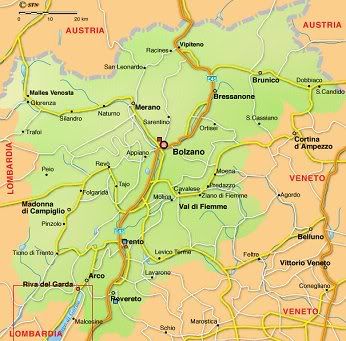
ST. JOSEPH FREINADEMETZ, SVD
Joseph Freinademetz was born on April 15, 1852, in Oies, a small hamlet of five houses situated in the Dolomite Alps of northern Italy. The region, known as South Tyrol, was then part of the Austro-Hungarian empire. He was baptised on the day he was born, and he inherited from his family a simple but tenacious faith.
While Joseph was studying theology in the diocesan seminary of Bressanone (Brixen), he began to think seriously of the foreign missions as a way of life.
He was ordained a priest on July 25, 1875, and assigned to the community of Saint Martin very near his own home, where he soon won the hearts of the people. However, the call to missionary service did not go away.
Just two years after ordination he contacted Fr. Arnold Janssen, the founder of a mission house which quickly developed into the Society of the Divine Word (SVD, after its Latin initials).
With his bishop's permission, Joseph entered the mission house in Steyl, Netherlands, in August 1878. On March 2, 1879, he received his mission cross and departed for China with Fr. John Baptist Anzer, another Divine Word Missionary.
Five weeks later they arrived in Hong Kong, where they remained for two years, preparing themselves for the next step. In 1881 they travelled to their new mission in South Shantung, a province with 12 million inhabitants and only 158 Christians.
Those were hard years, marked by long, arduous journeys, assaults by bandits, and the difficult work of forming the first Christian communities. As soon as a community was just barely developed an instruction from the Bishop would arrive, telling him to leave everything and start anew.
Soon Joseph came to appreciate the importance of a committed laity, especially catechists, for first evangelisation. He dedicated much energy to their formation and prepared a catechetical manual in Chinese.
At the same time, together with Anzer (who had become bishop) he put great effort into the preparation, spiritual formation and ongoing education of Chinese priests and other missionaries. His whole life was marked by an effort to become a Chinese among the Chinese, so much so that he wrote to his family: “I love China and the Chinese. I want to die among them and be laid to rest among them.”
In 1898, Freinademetz was sick with laryngitis and had the beginnings of tuberculosis as a result of his heavy workload and many other hardships. So at the insistence of the bishop and the other priests he was sent for a rest to Japan, with the hope that he could regain his health. He returned to China somewhat recuperated, but not fully cured.
When the bishop had to travel outside of China in 1907, Freinademetz took on the added burden of the administration of the diocese.
During this time there was a severe outbreak of typhus. Joseph, like a good shepherd, offered untiring assistance and visited many communities until he himself became infected. He returned to Taikia, the seat of the diocese, where he died on January 28, 1908. He was buried at the twelfth station on the Way of the Cross, and his grave soon became a pilgrimage site for Christians.
Freinademetz learned how to discover the greatness and beauty of Chinese culture and to love deeply the people to whom he had been sent. He dedicated his life to proclaiming the gospel message of God's love for all peoples, and to embodying this love in the formation of Chinese Christian communities.
He animated these communities to open themselves in solidarity with the surrounding inhabitants. And he encouraged many of the Chinese Christians to be missionaries to their own people as catechists, religious, nuns and priests. His life was an expression of his motto: “The language that all people understand is that of love.”
From the Vatican site
[Modificato da TERESA BENEDETTA 05/08/2008 15:59] |
|
|
|
|